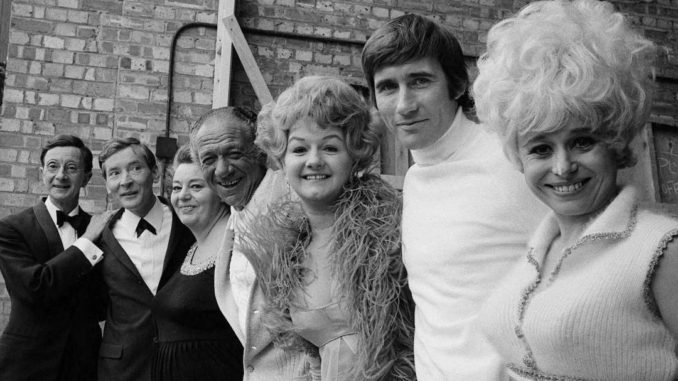
[March 2007] The Carry On films may be the most quintessentially British series of movies ever made, ahead even of such contenders as Monty Python or the Hammer horrors. For these were funded with purely British money; shot almost entirely in Pinewood Studios (with the very occasional excursion for location shooting, though never further than Wales); and with a cast who were almost entirely British, save the odd guest star like Phil Silvers or Elke Sommer. Little wonder, perhaps, that they achieved huge success in the UK (and remain enormously popular) but were generally less successful outside their country of origin. It’s probably because their humour is a unique blend of innuendo, puns and sarcasm that’s almost impossible to translate, or even explain. Toss in the fondness for occasional cross-dressing and you’ve got something that’s as close to a cinematic version of pantomime as we’ll ever see, albeit without the songs.
The films were all the results of a partnership spanning more than thirty years, between producer Peter Rogers and director Gerald Thomas, who worked on all the films: the vast majority of the scripts were by Norman Hudis or Talbot Rothwell. This may help explain the unmistakeable stamp of the series, that’s visible in almost all the entries. Rogers and Thomas had made films before, their partnership starting in 1956 with Circus Friends, for the Children’s Film Foundation. In these pre-Carry On days, they also gave Sean Connery his first speaking role, as “Welder #1” in the suspense film Time Lock, based on a play by Arthur (Airport) Hailey. But it was in the genre of seaside-postcard comedy that they struck gold.
What follows are reviews of the Anglo-Amalgamated entries; the series switched distributors to Rank in 1966, and continued there, initially to great success: Camping was the highest-grossing film in the UK for the year. The series did eventually drop off significantly, both in quality and commercial value, after Rothwell left in 1974, but limped through four more features and a compilation to its current conclusion, with the universally loathed Carry On Columbus [though I found it still had its moments]. However, Carry on London, starring Vinnie Jones and Shane Richie, and directed by Peter Richardson is apparently in pre-production; Peter Rogers, now aged 93, is also involved. Whether it will ever come to anything – and, if so, what – remains to be seen…
[January 2024] After a brief hiatus of… almost seventeen years, I’m returning to the topic, picking up where I left off with the Rank era movies, covering one a week for the next three or four months. Oh, and nothing ever did come of Carry On London, being shelved after the death of Rogers in April 2009. There have been other aborted efforts to reboot the franchise, most recently in 2020, though COVID stopped that from going into production. I’m sure there will be further attempts to exploit the IP, but after the death of Barbara Windsor in December 2020, leaving Jim Dale the last surviving member of the main troupe, you wonder why anyone would bother. Some things are probably better off left as they were.
Carry On Sergeant (1958)
Rating: C+
Dir: Gerald Thomas
Star: Bob Monkhouse, William Hartnell, Bill Owen, Kenneth Connor
This was the first entry – Val Guest’s Carry On Admiral, made the previous year, only inspired the title here. Indeed, the film was no original work, but based on The Bull Boys, a story about a ballet-dancer whose boyfriend is called up to serve on the day of their marriage, rewritten as a comedy by Norman Hudis. Still, the series hits the ground running, the familiar core already in place: quirky characters in off-the-wall situations, though the farcical elements are reined back somewhat here, and the innuendo that became a staple of the series is almost entirely missing. Future smug gameshow host Monkhouse plays the conscript, and his new wife (Shirley Eaton, later on to achieve gold-painted fame as a Bond girl) gets a job in the canteen to stay near him – while ten years later, this would likely have led to all manner of sexual hi-jinks, here, that angle is all but ignored.
Instead, the main plot is these recruits’ incompetence, under Sgt. Grimshawe (Hartnell pre-Doctor Who – he and Charles Hawtrey played similar roles here and in 1950’s hit TV series, The Army Game); he seems doomed to lose a £50 bet, that he’ll have the best platoon in his final weeks before quitting the Army. There’s also an ongoing thread about the unending hypochondria of Private Strong (Connor), which brings him into conflict with camp doctor Captain Clark, played by Hattie Jacques, the matronly kind of role she’d occupy often in the series. She gets the best line, in response to Strong’s concern about his ‘floating knee’, spitting out “Let me know when you feel it sinking.” Similarly, Hawtrey is the uber-wimp we know and love, but Kenneth Williams is a surprise. His character, while still a know-it-all, is oddly subversive, with Williams restrained, not mining every ounce of camp from the role, as he’d later do, with great success. Though the concept is extremely dated (Britain abandoned conscription in 1960), enough humour flows, mostly from the great characters, to keep the film ticking over.
Carry On Nurse (1959)
Rating: D
Dir: Gerald Thomas
Star: Terence Longden, Wilfrid Hyde-White, Kenneth Connor, Shirley Eaton
Hospital humour was the most productive vein for the Carry On team, mined no less than four times. Can’t blame them for going back to the well, considering that this was the top-grossing film of the year in the UK, and even a hit in the United States, a rare success abroad for the series. It’s especially odd, because this isn’t very funny. It’s a procession of vaguely interesting characters, given almost nothing to do, and the result is a series of scenes barely joined together, with little or no plot worthy of the name. A bunch of male patients in a ward banter, the nurses flitter around decoratively, but the only truly memorable sequence is when patients drunkenly agree to remove a bunion from one of their number – and that’s because it teeters on the edge of genuinely disturbing.
The most entertaining performance is Hyde-White’s Colonel, foreshadowing his other great “Colonel” role, in My Fair Lady. However, he’s stuck in a private room, so never gets to interact with the others, and the results are generally lumpy and uneven comedy. This was also Joan Sims’ Carry On debut, another crucial puzzle piece – she was in more of them than anyone else bar Kenneth Williams. Similarly to its predecessor, this was based on a previous work; in this case, Ring For Catty, a play co-written by Patrick (Father, Dear Father) Cargill. [Thomas filmed it again three years later, as Twice Around the Daffodils, starring Williams + Sims there too] In minor roles here, watch for a young June Whitfield as Leslie Phillips’ wife, and the future Mrs. Charles Bronson, Jill Ireland, playing (of all things!) Williams’ girlfriend. You’ll find looking for them a welcome distraction from the script.
Carry On Teacher (1959)
Rating: B-
Dir: Gerald Thomas
Star: Ted Ray, Kenneth Connor, Leslie Phillips, Richard O’Sullivan
The third film in the series was the first one which was cut from wholly original cloth, and the results work nicely. In a big step forward, there’s a genuine story here, with characters that seem to have been written specifically for the actors. The plot concerns Mr. Wakefield (Ray), headmaster of Maudlin Street school – he plans to leave for a new post, but has to get past a week-long visit from a school inspector and a psychology researcher (Phillips). However, the pupils get wind of this and prepare to wreak havoc for the visitors, climaxing at the school production of Romeo and Juliet [O’Sullivan, later to achieve fame in Man About The House, plays the young ringleader who instigates the chaos]
It’s remarkably warm-hearted, despite frequent references to corporal punishment which, even if never inflicted, may seem barbaric in these enlightened days. [Though it never hurt me ;-)] Also, the sequence where the pupils convince the teachers they’re going to blow up the school is creepy, not funny, thanks to Columbine – albeit that’s hardly the film’s fault. However, in general, it’s solidly amusing, with perhaps the highlight being “Question Time” where Kenneth Williams’ English teacher is harassed to his wits’ end by the class regarding Romeo and Juliet, and why a “school’s edition” is necessary. However, all the cast get their moments of glory, and provide a strong ensemble performance. Because of contract issues, this was the only film in which Ray would appear; while he’s very good here, the loss immediately became perhaps the series’ biggest strength.
Carry On Constable (1960)
Rating: D+
Dir: Gerald Thomas
Star: Sid James, Kenneth Williams, Kenneth Connor, Leslie Phillips
It seems strange now to appreciate that Sid James – the face and voice of Carry On – didn’t appear until the fourth entry in the series. He replaced Ted Ray here, and it’s impossible now to think of the movies without seeing his wrinkled features or hearing his deliciously dirty laugh. For his debut, however, James is in an almost unthinkably straight role, as the suffering police sergeant trying to keep a bunch of useless recruits from causing chaos, when they’re thrown in to relieve a station beset by a flu epidemic. And even by the standards of Carry On, the latter are shallow, barely caricatures: Williams plays a constable obsessed with physiognomy; Connor, a slave to superstition; Phillips, an upper-class twit.
These are not enough to hang a film on, and the plot is equally thin, little more than a sequence of incidents, many of which it is difficult to believe ever seemed funny. They even have someone slipping on a banana-skin – wasn’t that consigned to the Book of Cinematic Cliches back in the silent era? In the last ten minutes, a wages robbery is rapidly committed, investigated and – really, I’m giving nothing away – solved by our talentless coppers, more by accident than design. If that had been spread through the entire film, it might have helped glue everything together somewhat better, though future Miss Marple Joan Hickson gives an engagingly loopy cameo as a drunken old lady. The most memorable moment (beyond Phillips’ buttocks, which I’d rather forget!) is seeing a version of the 411 scam, done face-to-face. Guess it pre-dates Nigeria’s access to the Internet…
Carry On Regardless (1961)
Rating: B
Dir: Gerald Thomas
Star: Sid James, Kenneth Williams, Joan Sims, Kenneth Connor
While retaining the almost sketch-based nature of the early film, the setting of a “no job refused” employment agency, lends itself well to this: the usual selection of quirky characters get sent out on a variety of very odd assignments. Around them is a supporting cast that’s almost an all-star team of 60’s Britain: Fenella Fielding, Nicholas Parsons, Patrick Cargill, Molly Weir and former Light-Heavyweight World Champion Freddie Mills (a friend of the Krays, who ended up shot in the head). Perhaps the best such cameo is seeing Stanley Unwin speaking his trademark gobbledegook, to the utter befuddlement of James and his secretary.
As in Sergeant, James is the glue holding the film together, which again gives him limited opportunities for comedy. However, he does shine in one sequence when mistaken for a famous doctor, and we get to hear his lecherous laugh for the first time, which lights up the film like a firework. Joan Sims also has a great scene, totally sloshed after misinterpreting the point of a wine-tasting, and most of the skits are at least amusing – though some, such as the Home Improvement Exhibition, lack any structure and never amount to much. The comedic highlight probably comes when Gabriel Dimple (Charles Hawtrey) is supposed to be moving someone’s pet birds, but is mistakenly sent to a strip-club. The results are absolutely classic Carry On:
Manager: What do you want?
Dimple: Your birds, and I can’t wait. Tell me, what sort are they?
Manager: What sort do you like?
Dimple: Blue tits. Have you got any?
Manager: No. No, this place is centrally heated.
Dimple: Ooh! Tropical birds!
Manager: We have got one from Ceylon, yes.
Carry On Cruising (1962)
Rating: D+
Dir: Gerald Thomas
Star: Sid James, Kenneth Williams, Kenneth Connor, Liz Fraser
Look! It’s in colour! Just a shame the same can’t be said about the script or characters, which have little to offer as far as humour goes. James plays the captain of Mediterranean cruise ship, the S.S. Happy Wanderer. He has his eye on an Atlantic liner post, but gets stuck with a bunch of new swabs, including his first mate (Williams) and doctor (Connor), who persist in screwing things up every chance they get. If this sounds familiar, that’s because it is almost exactly the same, in both scenario and characters, as Constable and Regardless. Even when now in glorious colour, it’s not exactly fresh, and feels more like reheated leftovers, with a sprig of garnish in an attempt to give the impression of something new. It fails, much as the badly-integrated use of stock footage fails to convince you they ever left the Pinewood lot.
In other issues, there’s way too much reliance on people falling over and other slapstick, with only the odd moment of genuine wit. For example, Williams interrupts his captain’s statement that, “I’m going to use a psychological approach – I don’t claim to be a Jung man…” with the great riposte, “So long as you’re Jung at heart, sir.” James still hasn’t quite found his niche, as shown by the restrained reaction when a female passenger makes a pass at his character. Little wonder, then, that this was the final entry to be written by Norman Hudis; his scriptwriting talents, for the Carry On series, at least, were clearly running on fumes by this point.
Carry On Cabby (1963)
Rating: B-
Dir: Gerald Thomas
Star: Sid James, Hattie Jacques, Kenneth Connor, Liz Fraser
Back in black (and white), with new scriptwriter, Talbot Rothwell, bringing a whole new depth to proceedings. While James is still the “man in charge”, here he’s definitely a working-class hero, Charlie Hawkins, who runs the Speedee Taxis cab company. However, after missing his anniversary night out, his wife Peg (Jacques) decides to teach him a lesson by secretly setting up GlamCabs, which employs only dolly birds and uses the brand-new Ford Cortina(!), so steals away much of Charlie’s business. He’s not one to take that lying down, of course, and a full-scale feud erupts between the two companies. However, Speedee’s tea-lady (Fraser) relays all Charlie’s plots to Peg…
This wasn’t intended as a Carry On film – it was originally titled Call Me a Cab and only acquired its name at the last minute, due to a request from the distributors. That may explain why it’s less “obvious” than its predecessors, and indeed, for 1963, is pretty forward-thinking as far as roles for women go, and its view of the battle between the sexes. There’s no doubt who the smarter ones are here, though there is nothing malicious or harsh about the warm-hearted humour, and everything comes right in the end, naturally. This is probably more gentle sexual satire than anything else, and as such is inevitably a product of its time. Still, it works remarkably well, with Jacques in particular, seizing the chance to do some genuinely good acting.
Carry On Jack (1963)
Rating: B-
Dir: Gerald Thomas
Star: Bernard Cribbins, Juliet Mills, Kenneth Williams, Charles Hawtrey
Like Cabby, this wasn’t planned as a Carry On; the original title was Up the Armada, until the censor objected! It isn’t very highly-regarded among fans, maybe because, outside Williams and Hawtrey, no regulars showed up for the series’s first jaunt into period drama (Liz Fraser was slated for the role played by Mills). The star is Albert Poop-Decker (Cribbins), a new midshipman who finds his identity stolen by Sally (Mills), on a quest to find her lover. However, both end up on HMS Venus, under the command of Capt. Fearless (Williams), whose name could not be less appropriate. Through a series of misadventures, they are all cast adrift and stuck in Spain, but as usual, everything ends up for the best, albeit with the count of limbs reduced by one…
Despite low opinions elsewhere, I liked it: for perhaps the first time, Williams gets the kind of upper-class twit role he was born to play, and takes full advantage. The finest moment is the fabulous face he pulls in the lifeboat, after realising the implications of the following: “Now, now: calm down! No hysteria! Try not to think that we’re all alone…on a shark-infested ocean…with nothing to eat…two or three hundred miles from land…and right off the shipping lanes.” Brilliant. Cribbins is equally good, a very sympathetic hero, and while Mills really isn’t fooling anyone dressed as a man, that isn’t the point. Donald Houston also deserves praise as the sadistic first officer, to whom both Fearless and Poop-Decker are devils incarnate. Overall, there are less “jokes” to be found here, but more amusing situations, and I found the overall effect to be solidly entertaining.
Carry On Spying (1964)
Rating: C
Dir: Gerald Thomas
Star: Kenneth Williams, Bernard Cribbins, Barbara Windsor, Charles Hawtrey
The spoofing here is more specific than usual, obviously targetting the Bond movies. Williams leads a team of inept agents, more (Hawtrey, as Charlie Bind, Agent Number o-o…oh – which almost provoked a lawsuit from the Broccolis, and forced the producers to change his first name from James) or less (Windsor, in her Carry On debut), as they try to recover a secret formula, and keep it from falling into the hands of S.T.E.N.C.H. They’re led by the evil Dr. Crow, played by Juliet Furze, but dubbed by John Bluthal, to weird but effectively villainous result. It’s back to b&w, for the last time, as a nod to film noir. The Third Man‘s another victim; to be honest, this side of things probably works better than the Bond elements – that series wouldn’t properly find its own feet, until the release of Goldfinger, six months later.
There’s no doubt Windsor hit the ground running, with exactly the right attitude to fit into the series, feistily naive, and totally oblivious of the effect she has on the opposite sex. Mind you, the sight of Bernard Cribbins dressed as a belly-dancer is one that will require a large helping of mental bleach. The film allegedly bips around Vienna, North Africa and the Orient Express, though it’s not exactly convincing, and the finale in STENCH’s headquarters is painfully overlong, not least for the lengthy reverse footage sequence. It does have what may be the first on-screen deaths in Carry On, when two guards shoot each other. I remember this one fondly from my youth, but in the harsh light of the 21st century, it hasn’t aged well.
Carry On Cleo (1964)
Rating: B
Dir: Gerald Thomas
Star: Kenneth Williams, Sid James, Kenneth Connor, Amanda Barrie
“Infamy! Infamy! They’ve all got it infamy…” Perhaps the single best-known line from the entire series, as uttered by Julius Caesar (Williams) after an assassination attempt – even though it was actually written by Frank Muir and Dennis Norden for their radio show, Take It From Here. No matter, for did the series ever have better casting than in this entry? Beside Williams, there’s James as Mark Anthony, Connor as witless British craftsman Henghist Pod (who only makes square wheels) and Barrie as Cleopatra: all perfect in their roles. The production values are also higher than usual, helped by leftover sets and costumes from big-budget bust Cleopatra; the humour remains as lowbrow as ever, however, such as Hengist’s wife being named Senna.
The plot actually makes more sense than some, with Pod mistaken for a great fighter, after an unfortunate incident involving the Vestal Virgins, and subsequently employed as Caesar’s bodyguard. Meanwhile, Anthony falls for Cleo, and agrees to kill Caesar in exchange for her favours. It’s all very entertaining, and without a dull moment, though certainly, could never be mistaken as anything other than a 40-year old comedy, possessing its full share of groaners with whiskers on them. However, even the lines apparently rescued from Christmas crackers, are delivered with such enthusiasm and timing, that they still work surprisingly well. Definitely one of the top entries, with everything coming together beautifully.
Carry On Cowboy (1965)
Rating: C+
Dir: Gerald Thomas
Star: Sid James, Jim Dale, Kenneth Williams, Angela Douglas
The Rumpo Kid (James) takes over Stodge City, and its mayor (Williams) sends for help. Unfortunately, this comes in the form of sanitation engineer Marshall P. Knutt (Dale), rather than any real assistance. Still, take what you get, and Knutt is forced into duty anyway. Though Bob Hope’s The Paleface would be an obvious inspiration, this bears some striking resemblance to F-Troop, an American sitcom that began six months before Cowboy was released in the UK. Among the common elements: an inept bungler sent to take charge in a remote town; a local Indian tribe (all played by non-natives!) who need to be bribed to attack; and a girl who’s more competent with a gun than the men. While fairly standard comic contrivances, it’s an interesting overlap.
Credit to the producers for coming up with a credible stand-in for the Wild West, turning Surrey countryside into prairie, complete with cacti. Less successful are some of the accents: James does okay, but most of the others drift between Ealing and Tombstone. Jim Dale’s apparent efforts to channel the spirit of Norman Wisdom irritate more than they amuse, and Williams isn’t up to much either. The rest of the cast, however, are decent to strong, with Charles Hawtrey stealing the show, as the most non-PC depiction of a chief you’ll ever see. Look out during the Indian attack on the stagecoach: the arrow is stuck to the front of the driver’s shirt, and he’s simply holding it down until he gets “shot”! Ah, the joys of DVD…
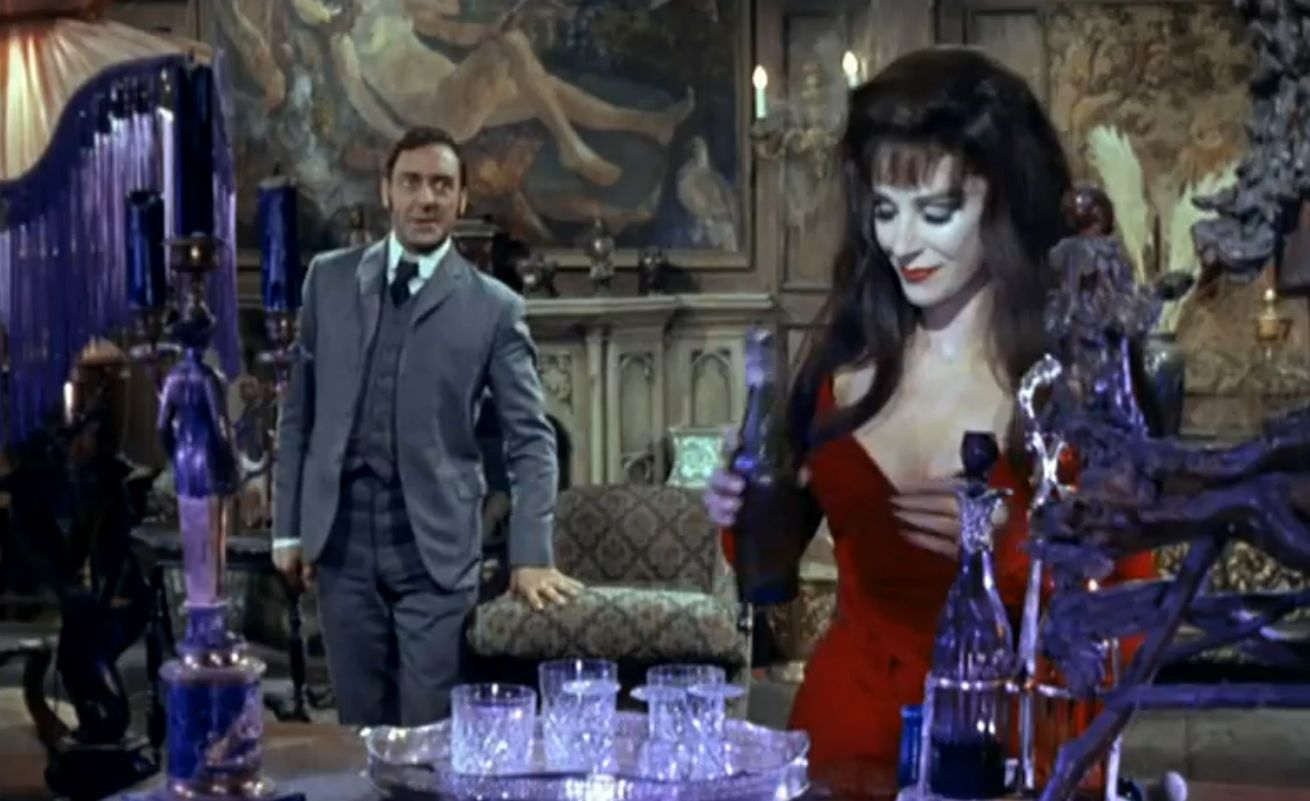
Carry On Screaming! (1966)
Rating: C+
Dir: Gerald Thomas
Star: Harry H. Corbett, Jim Dale, Kenneth Williams, Fenella Fielding
Cue the first selection by the chosen criteria which genuinely surprised me, mostly due to the high rating. At 6.8 on IMDb, this topped the horror rankings for the year – ironically, ahead of four of the Hammer movies it loosely parodies. It also has the highest score of any entry in the Carry On franchise. My original review (below – it also details the plot, so I won’t bother here) suggested I didn’t agree with that elevated opinion. This time, I think I enjoyed it slightly more, though it did still suffer from major problems of pacing in the middle. Perhaps having absorbed the entire Hammer horror catalog made me more receptive to its humour?
It also borrows heavily from The Addams Family, which started in 1964. Valeria is inspired by the vampish Morticia, and hulking butler Socket (Bernard Bresslaw) is a Lurch knock-off. But adding to the Hammer resonance, Bresslaw almost got the part of Frankenstein’s monster in The Curse of Frankenstein, only he wanted two pounds a day more than Christopher Lee. It’s also worth noting that regular Carry On director of photography Alan Hume had experience in the horror genre, having worked in that role for Hammer on Kiss of the Vampire, as well as Amicus’s Dr Terror’s House of Horrors.
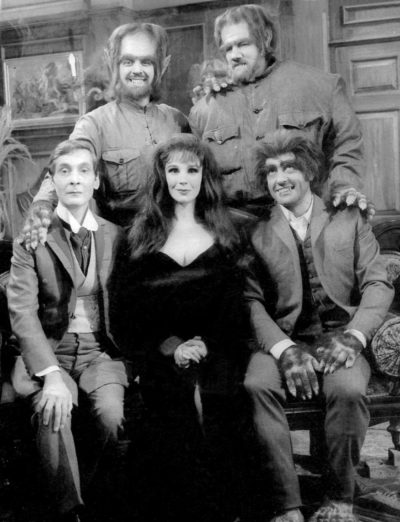 Screaming is missing Carry On stalwart Sid James, who would have played Detective Sergeant Bung. His absence is for the most British reason imaginable: when the film was shot in January and February of 1966, James was appearing in panto. Specifically, Babes in the Wood at the London Palladium. A remarkable hit, it played until June, well past the usual festive season run for pantomimes. Mind you, with lyrics and score written by The Shadows, it was star-studded, the cast also including Arthur Askey, Kenneth Connor, Roy Kinnear and, among the child singers, both Elaine Paige and the future Mrs. Ozzy Osborne.
Screaming is missing Carry On stalwart Sid James, who would have played Detective Sergeant Bung. His absence is for the most British reason imaginable: when the film was shot in January and February of 1966, James was appearing in panto. Specifically, Babes in the Wood at the London Palladium. A remarkable hit, it played until June, well past the usual festive season run for pantomimes. Mind you, with lyrics and score written by The Shadows, it was star-studded, the cast also including Arthur Askey, Kenneth Connor, Roy Kinnear and, among the child singers, both Elaine Paige and the future Mrs. Ozzy Osborne.
Williams and Fielding are the most memorable characters here, and largely save this: their sibling relationship was initially intended to be father-daughter, despite Williams being just a year older. Both of them go at the material with the necessary gusto – not that it may always deserve it. Still, Valeria’s delivery of “Do you mind if I smoke?” and the subsequent payoff is unforgettable, though to be honest, it makes absolutely no sense in the context of… Well, I can’t think of a context where it would make sense, to be honest. Even by the standards of the franchise, this is a joke that stands out for its almost zen-like stupidity. Though hell, I laughed.
This film does remain rather uneven, and that was often the Carry On peril. I actually like Corbett, in his only appearance for the franchise. He was responsible for my biggest laugh, after his wife (Joan Sims) complains he never takes her anywhere:
– “Oh, don’t exaggerate. We went out a couple of months ago. We had a lovely time.”
– “You call that lovely? To my poor, dear mother’s funeral?”
– “Well, I enjoyed it!”
It’s a classic sixties exchange, Corbett and Sims hitting their verbal marks with impeccable timing. But the rest of the characters on that side are largely forgettable. I find a little Peter Butterworth in drag goes a very long way.
Horror-comedy is always a tricky thing to pull off, because of the need to balance two genres which pull in almost opposite directions. You would expect this to skew almost entirely towards the comedy; yet I have to say, the horrific elements are certainly not negligible – even if, as you’d expect, largely played for amusement. Oddbodd is a genuinely creepy creature, like a hairy version of Frankenstein’s monster, and capable of regenerating from a single finger. Though they appear to have missed a trick, by not having Oddbodd Jr. be a “Mini-me” sized version: he’s a normal human (as can be seen on the right), only slightly smaller than his ‘parent’.
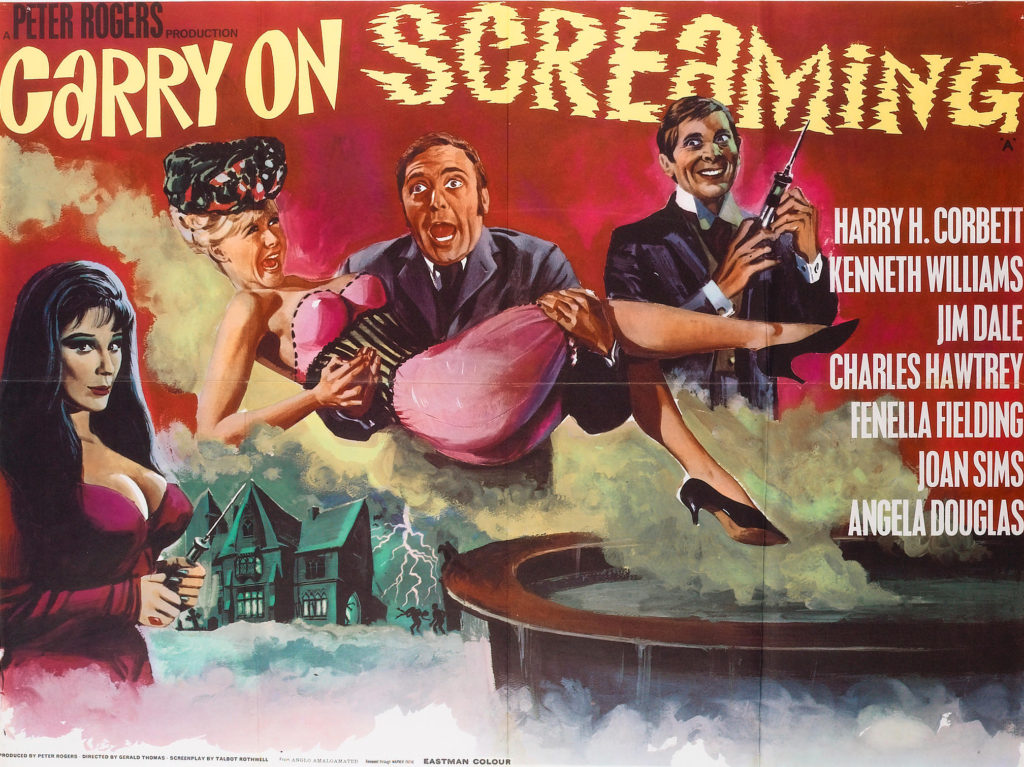
Add in the transformation of women into mannequins, House of Wax style, and you’ve got something which might conceivably merit a remake as straight horror. The ending especially, in which the villain falls into his own liquid, is right in line with House on Haunted Hill. There’s no denying that Talbot Rothwell’s screenplay has no interest in making fun of the genre, instead opting mostly to use the parade of oddball (or Oddbodd) characters to generate its humour. As parodies go, this is gentle stuff, even if it’s rarely less than the least subtle of comedies.
This article is part of our October 2022 feature, 31 Days of Classic Horror.
[March 2007 review] This was another one remembered fondly from my youth: the monstrous Oddbodd and the sultry Fenella Fielding both disturbed me…in different ways. Now, neither have much power, and the whole film comes over as nowhere near as good as I remember it. Corbett, as Sergeant Bung, is clearly filling in for Sid James, and though he has his moments, the gulf remains clear. He is investigating a string of missing women, eventually tracing them to Dr. Watt (Williams) and his sister (Fielding), whose bizarre scientific experiments are funded by their sale of tailor’s dummies made from the vanished women. Most of the regulars are present too: Joan Sims as Bung’s shrewish wife, Bernard Bresslaw playing the Watt’s butler and Charles Hawtrey as Dan Dan the Lavatory Man, as well as future Dr. Who, Jon Pertwee.
The target is clearly the Hammer horror style, and it does a decent job of capturing that. But the script is actually not that well-written, relying heavily on some groan-inducing puns, and a shameless theft from Abbott and Costello’s Who’s on First? routine. Truth be told, it took me three attempts to get through this: I simply fell asleep in the middle, and that’s where the main weakness of the movie lies. Once it establishes the premise and characters, there’s nowhere much to go, and the film marks time, grinding almost painfully and generally unamusingly, for the next hour, until a decent finale. Once again, not as good as I remembered it, at all. C
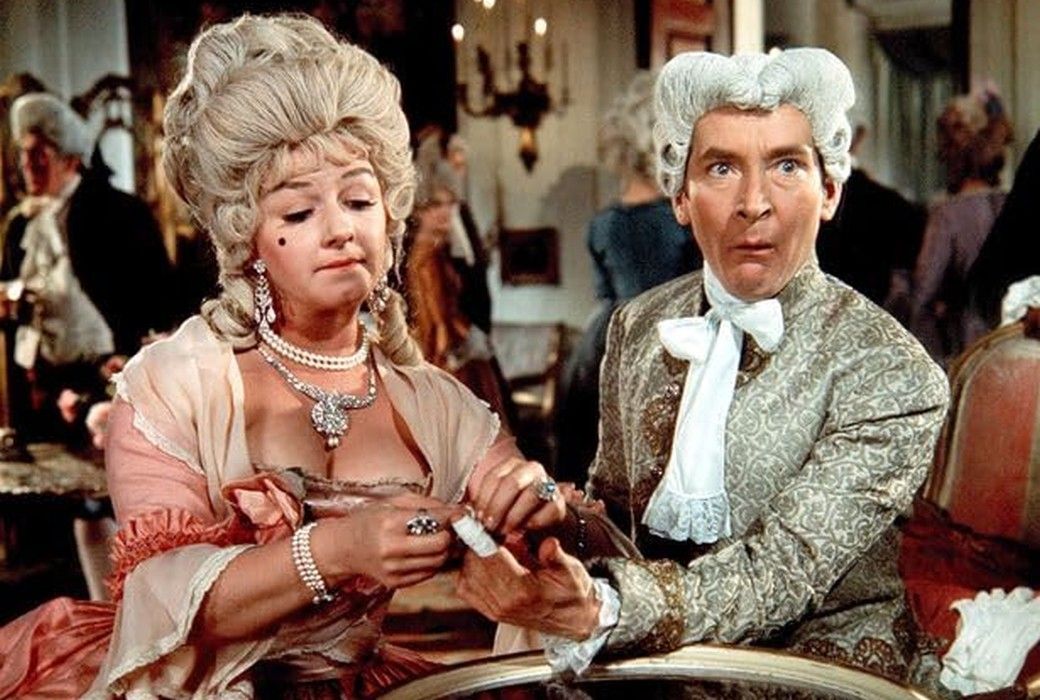
Carry On Don’t Lose Your Head (1967)
Rating: B
Dir: Gerald Thomas
Star: Sidney James, Kenneth Williams, Jim Dale, Joan Sims
The franchise lost its distribution, after a change at the top of Anglo-Amalgamated, moving over to Rank. However, this was not originally released with the “Carry On” part of the title, because Rank wanted to make a break with the product of its rival. But after poor initial box-office results, they re-instated it, and results improved subsequently. It’s certainly a strong entry, with some of the best production values in the series. Various stately homes were used for both exteriors and interiors, such as Clandon House and Waddesdon Manor, and set pieces like the Parisian square used a large number of extras. There’s a lot of costumes, wigs and period detail too, all adding to the atmosphere.
It’s a loose spoof of The Scarlet Pimpernel, with bored aristocrat Sir Rodney Ffing (James) moonlighting as “The Black Fingernail”, rescuing his colleagues from Madame Guillotine during the French Revolution. He’s ably assisted by sidekick Lord Darcy Pue (Dale), and hunted, with increasing desperation, by the evil Citizen Camembert (Williams), head of the revolutionary police. Camembert ends up travelling to England in pursuit of his prey, with sister Désirée Dubarry (Sims), and they do succeed in identifying Sir Rodney as the man of many disguises behind the fingernail. However, the Englishman is no easier to catch on his home turf, eluding the Frenchman and heading back to Paris to rescue his true love, Jacqueline (Dany Robin, who’d end up marrying James’s agent) from Camembert’s clutches.
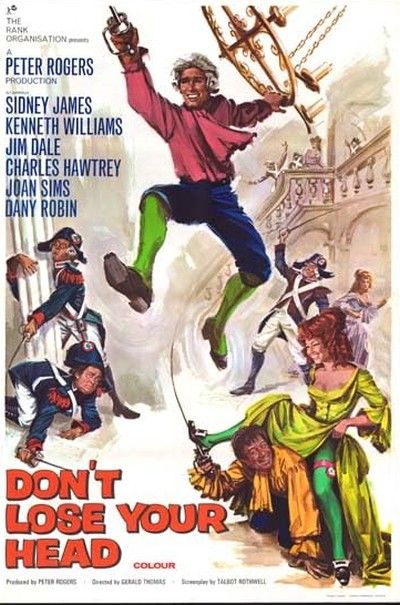 Most of the cast are near-perfectly cast in their roles. Though it’s surprising how well James can pull off an effeminate fop, in addition to his more earthy secret identity, whose talent for impersonation causes no end of mischief. But it’s likely Talbot Rothwell’s script which is the real start, serving up any number of lines with the cast deliver with the degree of relish necessary, e.g. “By this time tomorrow, the Duc de Pommfrit will have had his chips,” with or without an extra helping of double entendre: “But then, you’ve always had magnificent balls.” The duel between Sir Rodney and Camembert, fabricated by the latter over the dubious “honour” of Désirée, could have strayed in from a Marx brothers movie, such is its degree of physical absurdity.
Most of the cast are near-perfectly cast in their roles. Though it’s surprising how well James can pull off an effeminate fop, in addition to his more earthy secret identity, whose talent for impersonation causes no end of mischief. But it’s likely Talbot Rothwell’s script which is the real start, serving up any number of lines with the cast deliver with the degree of relish necessary, e.g. “By this time tomorrow, the Duc de Pommfrit will have had his chips,” with or without an extra helping of double entendre: “But then, you’ve always had magnificent balls.” The duel between Sir Rodney and Camembert, fabricated by the latter over the dubious “honour” of Désirée, could have strayed in from a Marx brothers movie, such is its degree of physical absurdity.
Indeed, the moment where I laughed loudest was simply Peter Butterworth as Camembert’s lackey, feeling for a missing horse with his hands, as if it had simply gone invisible. Then there is a genuinely good action set-piece at the end, with Sir Rodney, Lord Darcy and the Duc (Charles Hawtrey) fighting their way through Camembert’s mansion towards Jacqueline. It’s remarkably well-staged: Dale is most impressive, but James, then in his mid-fifties, holds his own, and Hawtrey engaging in energetic sword-play is not something I expected to see. Meanwhile, Camembert is bemoaning the property destruction resulting from the brawl: “Oh, beautiful things! Irreplaceable.” It all adds up to one of the campest of entries, with even James becoming a pantomime dame at one point. Yet it’s an approach which entirely fits the atmosphere.
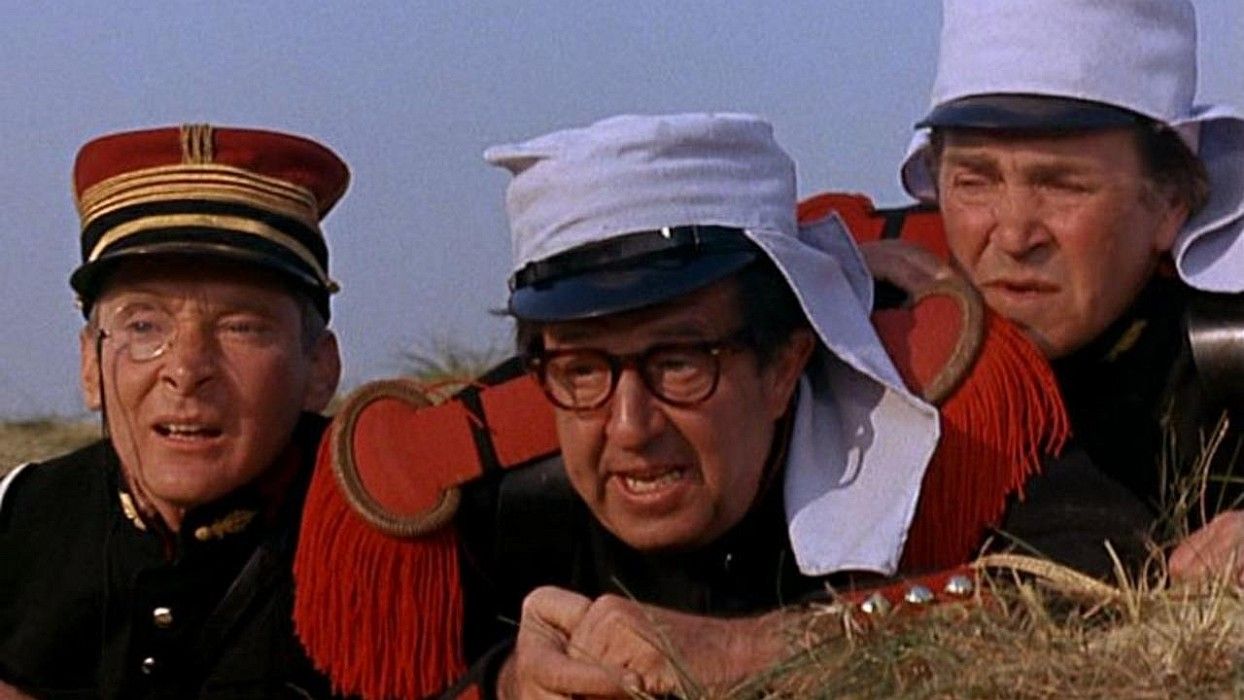
Carry On Follow That Camel (1967)
Rating: C-
Dir: Gerald Thomas
Star: Phil Silvers, Kenneth Williams, Jim Dale, Angela Douglas
Like predecessor Don’t Lose Your Head, this was originally released without the Carry On name, being retrofitted after the fact. It is considerably less successful than Head, to the extent you wonder what went wrong. Certainly, you can’t help feeling the absence of Sid James. The part of Sergeant Nocker was originally written for him, but a commitment to TV series George and the Dragon meant he had to be replaced. In an effort to appeal to the American box-office, the producers brought in Silvers, well-known there for his portrayal of Sergeant Bilko in the fifties. It didn’t work, the Yank seeming to have no feel for the particularly British form of humour needed by the franchise.
As with Head, it’s a spoof of classic literature, in this case 1924 novel Beau Geste. Dale plays Bertram Oliphant ‘Bo’ West, who leaves to join the French Foreign Legion under Commandant Maximilian Burger (Williams) – quite what a German is doing in command is never explained – after an unfounded accusation sullies West’s honour. There, he falls foul of Nocker, until he discovers the sergeant’s reputation as a hero is not warranted. Back in England, the accusation having been proven false, his girlfriend Lady Jane (Douglas) makes the hazardous trip to Africa to bring Bo home, but falls into the clutches of evil Arab Sheikh Abdul Abulbul (Bernard Bresslaw), who is plotting to attach the Legion’s outposts. Bo needs to stop the Sheikh, rescue Jane and redeem his reputation.
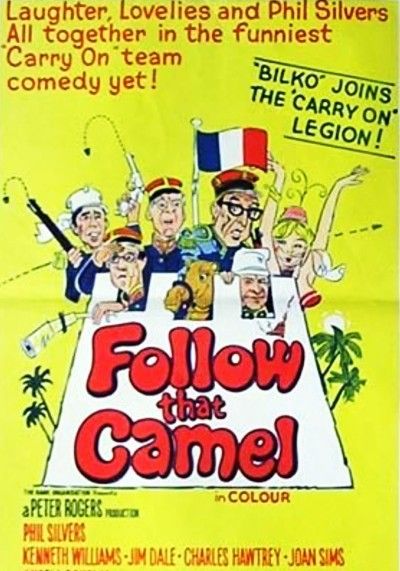 Talbot Rothwell’s script is not a patch on his one for Head, containing only the bare minimum of memorable lines. I did like Burger’s one about “many a good fiddle is played on an old dune” – detailed explanation available on request. I think it needs a stronger personality at its core: while Dale is a decent hero, he seems to be appearing in a straightforward adventure movie. There’s straight men, and then there’s straight men. As discussed above, Silvers doesn’t work, despite playing a character not dissimilar to his trademark Bilko. He certainly did not merit receiving the largest salary in Carry On history to that point. Silvers cost a whopping £30,000, more than ten percent of the entire film’s budget.
Talbot Rothwell’s script is not a patch on his one for Head, containing only the bare minimum of memorable lines. I did like Burger’s one about “many a good fiddle is played on an old dune” – detailed explanation available on request. I think it needs a stronger personality at its core: while Dale is a decent hero, he seems to be appearing in a straightforward adventure movie. There’s straight men, and then there’s straight men. As discussed above, Silvers doesn’t work, despite playing a character not dissimilar to his trademark Bilko. He certainly did not merit receiving the largest salary in Carry On history to that point. Silvers cost a whopping £30,000, more than ten percent of the entire film’s budget.
I will say, the makers did a good job of faking the Sahara. The Camber Sands dunes in East Sussex stood in for North Africa, though the unwanted presence of snow did delay shooting. Speaking of faking it, I also note the presence of then pop singer Anita Harris playing an Egyptian belly-dancer called, for some reason, Corktip. She is a surprisingly good belly-dancer, and being born in Somerset, an unconvincing Egyptian. In some ways, especially with its climax of a besieged garrison fighting off natives, it feels like a dry run for Up the Khyber, though the scale here is much smaller. So are the laughs, to be honest.
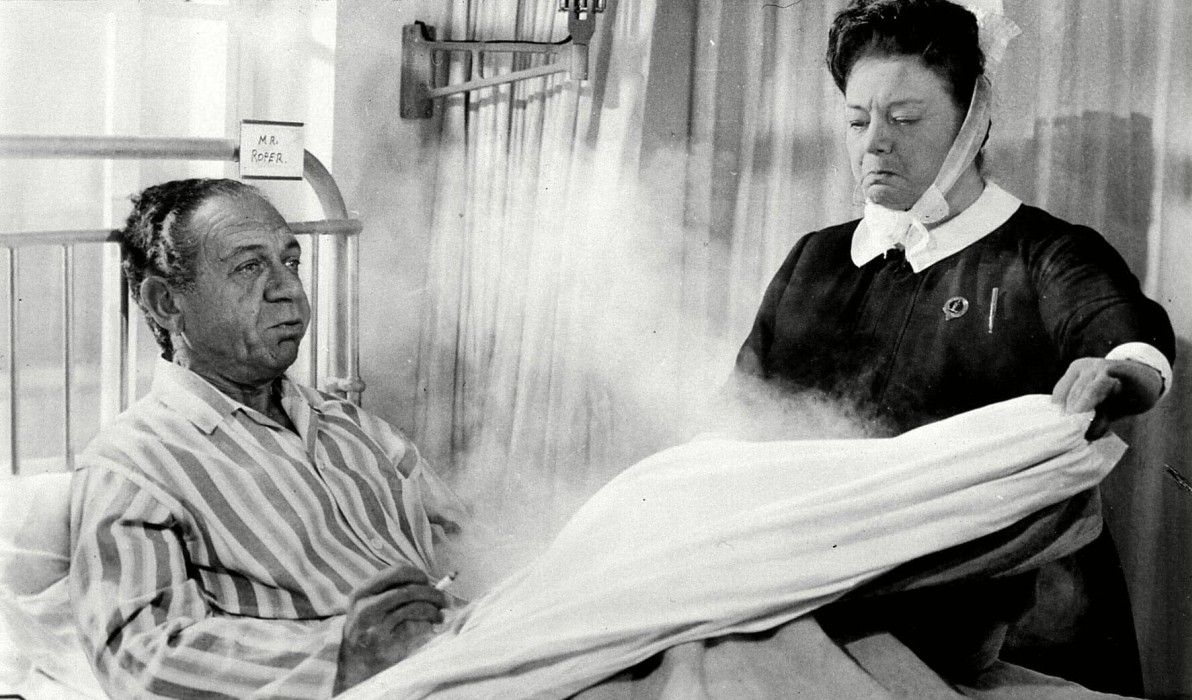
Carry On Doctor (1967)
Rating: B
Dir: Gerald Thomas
Star: Frankie Howerd, Sid James, Kenneth Williams, Hattie Jacques
This was a throwback in a few ways. It was the first entry since the change in distributor to be released with the “Carry On” prefix from the start. After the previous two settings has been period pieces, this one returned to a contemporary setting. And it also went back to the medical profession, first visited eight years previously in Carry On Nurse. At one point, there was consideration given to it being the last film, but a massive box-office success dictated otherwise. For this reportedly became the biggest domestic hit of the year at the UK box-office, trailing only The Jungle Book and Barbarella. It remains top-five ranked by IMDb rating, and for good reason.
It is ensemble comedy at its most effective. While the four actors listed above may be top-billed, there’s a slew of memorable characters all the way down to even those who have a single scene. It takes place in a hospital where self-help guru Francis Biggar (Howerd) is taken after he discovers the limits of mind over matter. The facility is both populated and staffed by an array of eccentric characters, including malingerer Charlie Roper (James), snobby physician Doctor Tinkle (Williams), and in one of her finest roles, Jacques as ultra-starched matron Lavinia, who has a middle-aged crush on Dr. Tinkle. But that only scratches the surface. Hot doc Dr. James Kilmore (Jim Dale). Nurse totty Sandra May (Barbara Windsor). Sympathetically pregnant Mr. Biddle (Charles Hawtrey).
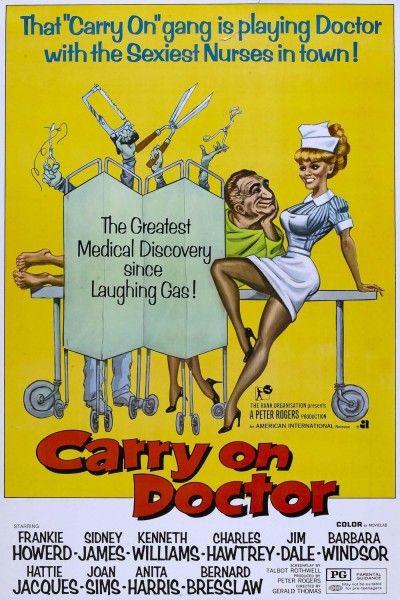 Given the lack of actual plot for the great bulk of this, it’s impressive how Talbot Rothwell’s script and Thomas’s punchy direction keep the comedy rolling. You’re rarely more than a few second from at least a smile, and often considerably more. Witness this glorious exchange between Mr. Biddle (Bernard Bresslaw) and Nurse Clarke (Anita Harris):
Given the lack of actual plot for the great bulk of this, it’s impressive how Talbot Rothwell’s script and Thomas’s punchy direction keep the comedy rolling. You’re rarely more than a few second from at least a smile, and often considerably more. Witness this glorious exchange between Mr. Biddle (Bernard Bresslaw) and Nurse Clarke (Anita Harris):
“Nurse, I dreamed about you last night.”
“Did you?”
“No, you wouldn’t let me.”
Forty-six years after its release, and having seen this film a dozen times at least over the years – albeit probably not for two decades – I still laughed out loud. I will be figuring out a way to work the line into my repertoire, going forward. It’s all vastly superior to the franchise’s previous hospital-based entry, without doubt.
It does perhaps run out of steam down the stretch, when an actual story shows up, concerning Tinkle’s bad faith efforts to fire Kilmore. This fires up the patients into a revolt against the inhuman treatment, with blanket baths and enemas as their weapons of choice. Frankly (pun not intended, for once!), it’s superfluous, though does provide a sense of justice, with the casual cruelty of Tinkle and his matron receiving its just deserts. I didn’t need it. I was perfectly happy just hanging out with this bunch of odd-balls, watching them function and scheme good-naturedly to achieve their personal ends. It feels like the kind of scenario which could easily have powered an entire sit-com series, such is the scope for comedy to be mined here.
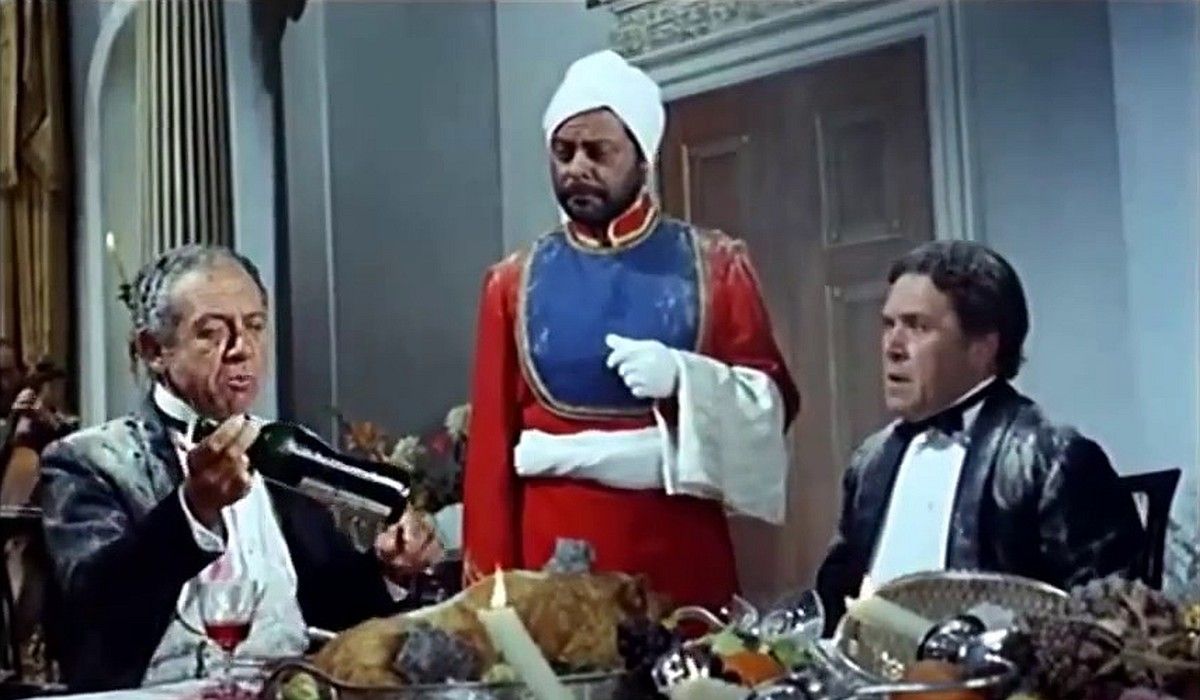
Carry on Up the Khyber (1968)
Rating: B-
Dir: Gerald Thomas
Star: Sidney James, Kenneth Williams, Charles Hawtrey, Joan Sims
This is often regarded as the greatest Carry On of the franchise: for example, it made the BFI’s list of the all-time top 100 British films in 1999. For me, it doesn’t quite reach the very highest tier, perhaps because it feels like it has a better set-up than execution. Still solid stuff, no question, and one sequence which is certainly an unquestioned classic. There’s perhaps more social satire than usual, with the stiff upper-lips of the British aristocracy ruthlessly mocked – though nobody on either side is spared, which helps counter the contemporarily awkward lack of any Asian actors at all. For as the title suggests, it’s a return to the period pieces popular since the switch to Rank, taking place in the Indian Raj, at the tail end of the 19th century. Well, theoretically in India. In reality, the Snowdon National Park stood in for the Khyber Pass – still the furthest the makers had travelled to that point.
Sir Sidney Ruff-Diamond (James) and his low-born wife Joan (Sims) are in charge of the province of Kalabar, which includes the Khyber pass, and must defend it from the anti-Empire forces of the Khasi of Kalabar (Williams) and tribal leader Bungdit Din (Bernard Bresslaw, in habitual brownface). The locals are fearful of the Scottish regiment, the 3rd Foot and Mouth, known as the “devils in skirts” – in particular, fearful of their testicles. But when one of them, Private Widdle (Hawtrey), is found to be wearing woolen underpants, rather than going commando, the reputation of the soldiers is no longer a barrier. Ruff-Diamond’s efforts at diplomacy fail to calm things down, leading Din to launch an all-out assault on the governor’s mansion.
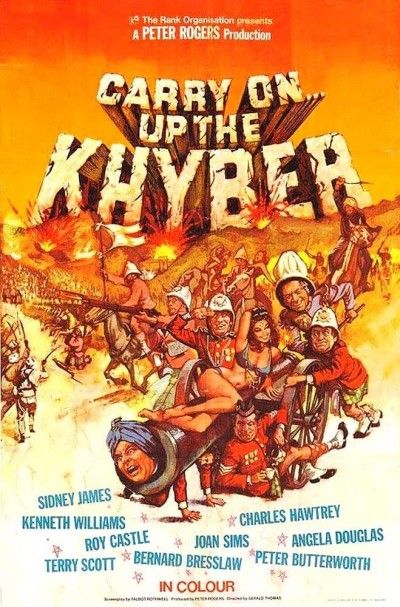 Brownface aside, it has been one of the more controversial titles since its release, when the censors insisted on the line “Fakir, off!” being cut before release. Since then, a TV screening during the first Gulf War was replaced with a less inflammatory entry, and as recently as 2020, ITV4 cut Din’s line, “That’ll teach them to ban turbans on the buses!” Never mind it making little or no sense now, being a reference to a conflict not long before the original time of release in Wolverhampton, over whether Sikh bus conductors could wear their religious head covering.
Brownface aside, it has been one of the more controversial titles since its release, when the censors insisted on the line “Fakir, off!” being cut before release. Since then, a TV screening during the first Gulf War was replaced with a less inflammatory entry, and as recently as 2020, ITV4 cut Din’s line, “That’ll teach them to ban turbans on the buses!” Never mind it making little or no sense now, being a reference to a conflict not long before the original time of release in Wolverhampton, over whether Sikh bus conductors could wear their religious head covering.
I wouldn’t say there’s too much else of note here. The Ruff-Diamonds are great characters, yet there are few lines to cherish, except for Sidney’s rejoinder to the Khasi’s greeting of “may his radiance light up your life,” with “And up yours.” However, there is that glorious sequence mentioned, where their dinner party (top) proceeds uninterrupted during Din’s ferocious bombardment, with only visiting missionary Brother Belcher (Peter Butterworth) paying the slightest attention. He gets steadily more hysterical at his colleagues’ stoic indifference as the attack escalates, eventually reduced to playing an imaginary flute and burbling, “Strawberry mousse! Strawberry moooooousse!” As both a celebration and critique of upper-class attitudes, it may never be beaten.
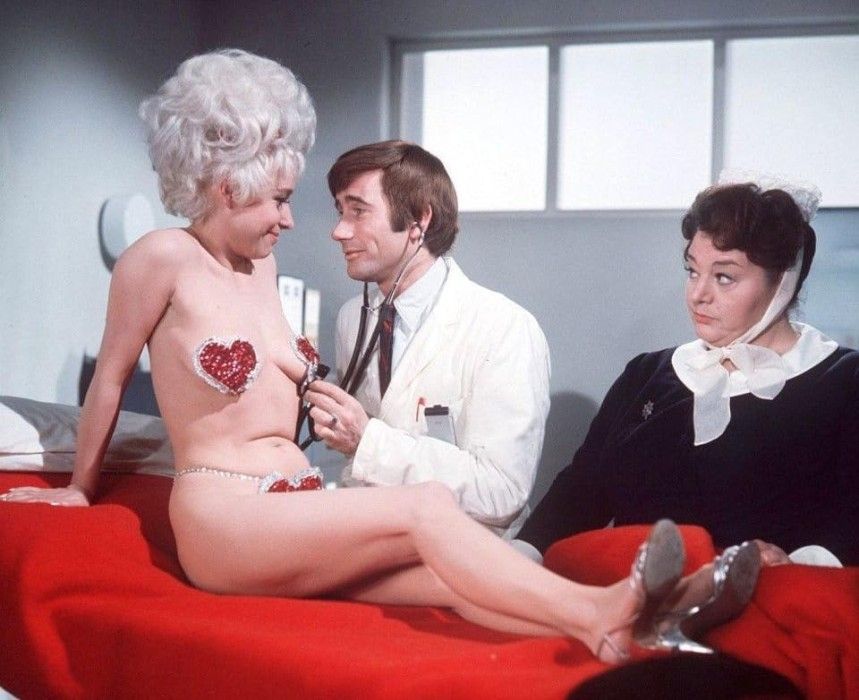
Carry on Again Doctor (1969)
Rating: C+
Dir: Gerald Thomas
Star: Jim Dale, Kenneth Williams, Sid James, Charles Hawtrey
After the massive success of Carry on Doctor, hardly a surprise to see the franchise go back to the same well. Though this time, the focus is more on the staff than the patients. In particular, Doctor Jimmy Nookey (Dale), an accident-prone physician who is forced out of the country after an unfortunate series of events, including his drinking some spiked punch at a hospital function. This takes him to a mission on the far-off Beatific Islands, which initially seems like a tropical hell. However, he discovers his orderly there, Gladstone Screwer (James) has a miracle weight-loss cure, which allows Dr. Nookey to return and make his fortune. But former boss Doctor Frederick Carver (Williams) wants the elixir’s secret, and will stop at nothing to get it.
By “nothing,” in particular we mean getting his subordinate, Doctor Ernest Stoppidge (Hawtrey) to pretend to be a woman, in order to infiltrate Nookey’s clinic. This is pure British panto damery at its finest, and stands in contrast to Stoppidge, which is likely one of Hawtrey’s straightest roles in the franchise. Though to the modern viewer, what stands out is that it’s only women who could possibly be interested in losing weight, hence the need for Stoppidge to dress up in drag. Beyond this, you have the usual supporting cast, including Barbara Windsor as model Goldie Locks, Hattie Jacques once again playing the matron, and way down the cast, future Mrs. Michael Caine (and former Miss Guyana) Shakira Baksh.
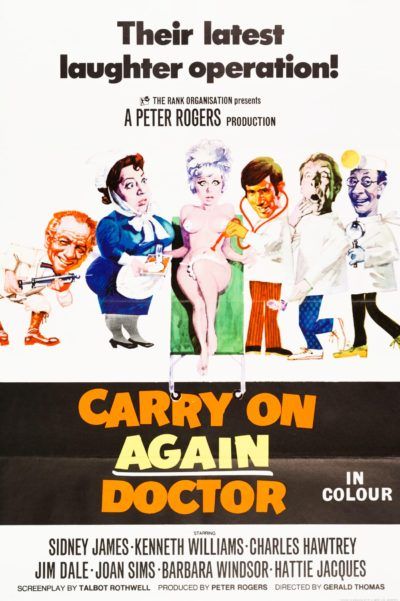 It’s Dale who holds this together, getting the bulk of the screen time; James may be top-billed, but he doesn’t show up until almost the half-way point. Dale delivers a very physical performance, doing all his own stunts. This came at no small cost, tearing a muscle in his arm and contributing to chronic back issues. It may be a factor in why this was his last appearance in the franchise for almost a quarter of a century, until Carry On Columbus. He makes for a very likeable hero, and there is genuine character development here, as he descends into alcoholism before returning, the toast of Harley Street.
It’s Dale who holds this together, getting the bulk of the screen time; James may be top-billed, but he doesn’t show up until almost the half-way point. Dale delivers a very physical performance, doing all his own stunts. This came at no small cost, tearing a muscle in his arm and contributing to chronic back issues. It may be a factor in why this was his last appearance in the franchise for almost a quarter of a century, until Carry On Columbus. He makes for a very likeable hero, and there is genuine character development here, as he descends into alcoholism before returning, the toast of Harley Street.
It does continue the slow tendency towards unsubtlety. I doubt a name like “Screwer” would have passed the censors at the start of the decade, or even the lengthy, joke alternate title, “If You Say It’s Your Thermometer I’ll Have to Believe You, But It’s a Funny Place to Put It.” As in Camping, Windsor’s breasts being almost exposed is a memorable moment (top), though Talbot Rothwell’s script has some good lines. For example, Nookey admiring an item in his tropical office, “That’s a good skeleton. Did the last doctor leave it here?” only to be told by Screwer, “That is the last doctor…” The overseas setting for the second act does provide a novel twist, yet a lot of the characters feel recycled from the notably superior Doctor. As a result, it feels too close to its predecessor.
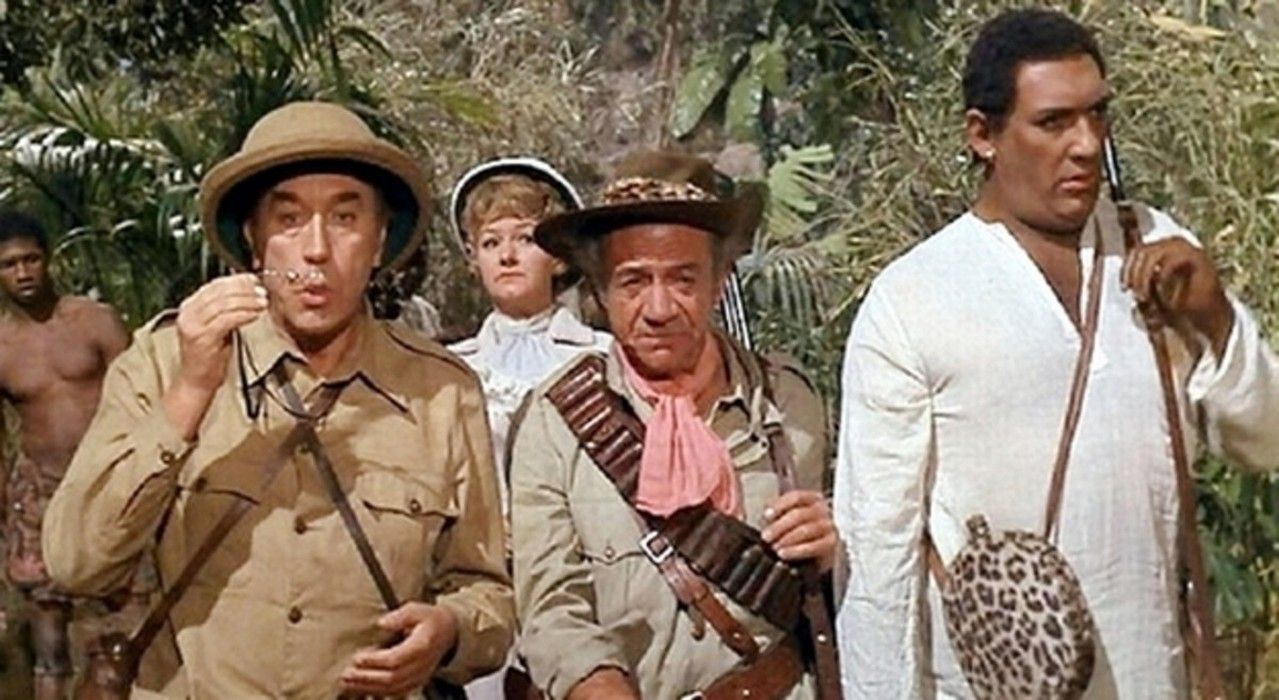
Carry on Up the Jungle (1970)
Rating: C+
Dir: Gerald Thomas
Star: Frankie Howerd, Sidney James, Joan Sims, Kenneth Connor
At times it feels like someone went back fifty years in a time machine, and made this movie for the sole purpose of triggering Letterboxd users. It is likely the most problematic in the series, for those who persist in judging material from previous eras by contemporary correctness. Which kinda misses the point, since if anyone is being depicted poorly here, it’s the English aristocracy. This is very much the same kind of class-based humour as Carry On Up the Khyber, with the ruling classes being taken out of their natural habitat, yet refusing to adapt their behaviour to the radically different situation.
In this case, it’s a jungle expedition, funded by Lady Evelyn Bagley (Sims), and led by ornithologist Professor Inigo Tinkle (Howerd, in peak “Oo-er, missus!” form). Also along is big-game hunter and guide Bill Boosey (James), and the head of his native bearers Upsidaisi (Bernard Bresslaw, naturally). The Professor is after the rare Oozlum bird, but Lady Evelyn seeks her son, lost on a previous expedition on which her husband was, apparently, eaten by a crocodile. The group find themselves first captured by cannibals, then it’s a case of “out of the frying pan, into the fire,” as they become the captives of the all-female Lubby-Dubby tribe, from the lost world of Aphrodisia. They need the men to breed, a prospect initially embraced by Boosey and co… until they see exactly who their brides are going to be.
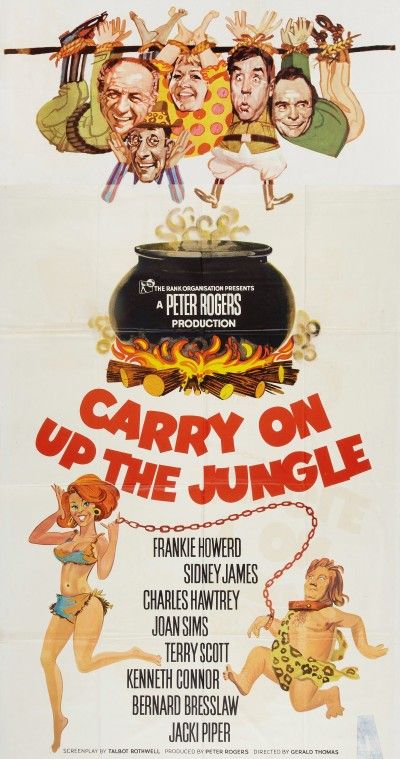 Around this, there’s a good deal more going on: it’s probably one of the busiest films in terms of plot. There’s an entire subplot involving Lady Evelyn’s son, who has grown up to become a native vine-swinger, Ug (Terry Scott). He falls for Evelyn’s maid, June (Jacki Piper), while the aristocrat is energetically looking for a man herself. This leads to an extended sequence where it feels like half the cast are climbing into, or escaping from, each other’s beds. And that also includes a “gorilla” that’s wandering around. Quotes used advisedly, since it’s the most obvious man in a suit you can imagine. And guess what? That’s the point. If you take it, or anything else here, at all seriously, then more fool you.
Around this, there’s a good deal more going on: it’s probably one of the busiest films in terms of plot. There’s an entire subplot involving Lady Evelyn’s son, who has grown up to become a native vine-swinger, Ug (Terry Scott). He falls for Evelyn’s maid, June (Jacki Piper), while the aristocrat is energetically looking for a man herself. This leads to an extended sequence where it feels like half the cast are climbing into, or escaping from, each other’s beds. And that also includes a “gorilla” that’s wandering around. Quotes used advisedly, since it’s the most obvious man in a suit you can imagine. And guess what? That’s the point. If you take it, or anything else here, at all seriously, then more fool you.
It is, very clearly, parody, with the targets including the Tarzan franchise, as well as films like Slave Girls. But it’s very equal opportunity in terms of its targets. Indeed, there’s a case to be made that Upsidaisi is the smartest and bravest character on view: his actions certainly lead to the party’s rescue. That’s he’s played in blackface by Bresslaw is almost par for the course, the actor having previously been an Arab sheik and Afghani tribal leader. Offense makes as much sense as thinking panto dames are taking roles away from women. I was also amused that Bresslaw spoke Swahili for the role. The “natives” – being mostly of Caribbean ancestry – couldn’t understand him. But Sid James, who was born and brought up in South Africa, did…
More importantly: is it funny? On occasion, it undeniably is, such as this dead-pan exchange between the party, just after they have been captured by the cannibals.
What’s that big pot?
Probably flatulence.
We’re going in that pot.
Us? Stewed?
Not a chance. Stone-cold sober.
Some of the elements are less successful. To be honest, the whole Lubby-Dubby subplot, despite the presence of Valerie Leon as their queen, goes on too long. It hasn’t got much to offer beyond “Blokes want sex with pretty women.” However, the interplay between the characters is genuinely amusing, and as ever, the jokes fly at everyone’s expense. Nobody here gets out alive. Least of all the Oozlum bird.
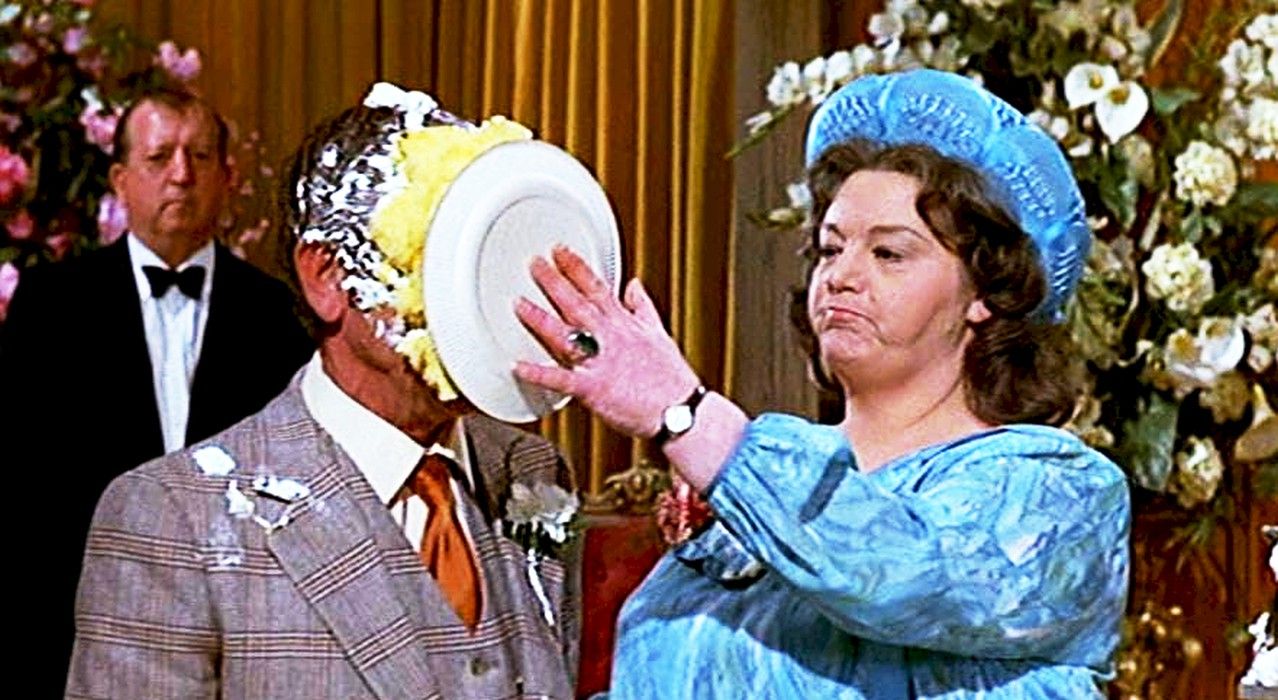
Carry on Loving (1970)
Rating: C+
Dir: Gerald Thomas
Star: Sidney James, Hattie Jacques, Kenneth Williams, Joan Sims
While sex had been a regular component of the Carry On films to this point, it had typically been couched in relatively veiled terms. This time, it becomes the central focus, the entire film basically inspired by the newly permissive attitudes which were becoming increasingly prevalent as Britain moved into the seventies. The tension between this new openness and traditional, deep-seated British prudery are the engine which drives the comedy in this. It centres on the Wedded Bliss dating agency, where Sidney Bliss (James) and long-suffering partner Sophie Plummett (Jacques) attempt to match their clients, most of whom are singularly unsuited for the purpose, due to one reason or another, e.g. “confirmed bachelor” Percival Snooper (Williams).
There’s a whole slew of love polygons resulting from this, though for once, at least they largely seem age-appropriate, such as Bliss, Plimmett and long-standing customer Esme Crowfoot (Sims), all of whom are at least middle-aged. Indeed, it’s kinda refreshing to see people of both sexes and that maturity, depicted as romantically and sexually active. While there are no shortage of dolly birds, they occupy an entire separate subplot, mostly involving the bland Bertrum Muffett (Richard O’Callaghan). For example, there’s a extended sequence where Bertrum is supposed to meet a prospect in a hotel bar, only to go home with the wrong girl, a model (Jacki Piper). Cue an extended stream of “How do you want me?” and “Shall I take my clothes off now?” comments, to Bertrum’s increasing discomfort. I can only presume Jim Dale was unavailable.
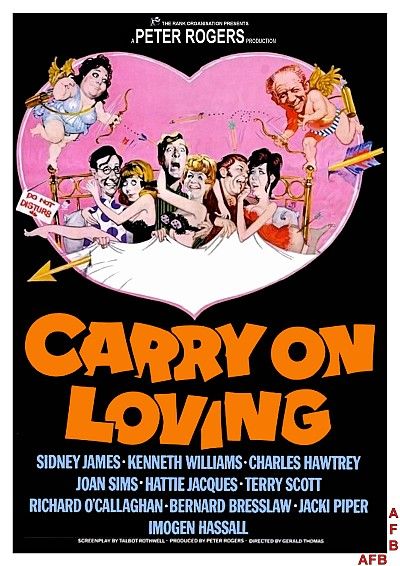 The fact that the film is plugged directly into specific elements from the zeitgeist of the time make it seems more dated than many entries. It’s almost Shakespearean in outlook, with the fashions and dialogue sometimes getting in the way of the comedy. There are still moments to treasure, such as Peter Butterworth showing up as a client looking for wife number three. His first spouse died after eating poisonous mushrooms, the second from a fractured skull. “How did that happen?” asks Sid. “She wouldn’t eat the mushrooms,” deadpans the prospective husband. It’s almost Jimmy Carr levels of darkness. The film ends in a glorious and energetic slapstick food-fight (top), which could have strayed in from a Buster Keaton short, and spares no-one.
The fact that the film is plugged directly into specific elements from the zeitgeist of the time make it seems more dated than many entries. It’s almost Shakespearean in outlook, with the fashions and dialogue sometimes getting in the way of the comedy. There are still moments to treasure, such as Peter Butterworth showing up as a client looking for wife number three. His first spouse died after eating poisonous mushrooms, the second from a fractured skull. “How did that happen?” asks Sid. “She wouldn’t eat the mushrooms,” deadpans the prospective husband. It’s almost Jimmy Carr levels of darkness. The film ends in a glorious and energetic slapstick food-fight (top), which could have strayed in from a Buster Keaton short, and spares no-one.
Also among the supporting cast are Charles Hawtrey as a largely incompetent private eye, Bernard Bresslaw as pro wrestler Gripper Burke, and bit parts for Bill Pertwee, Kenny Lynch and Bill Maynard. But there were a number of chunks which just didn’t hold my interest, and I drifted off into loosely connected research. For instance, the hotel bar where Bertrum meets his date was the Harte and Garter Hotel. It’s literally across the street from Windsor Castle, and in a previous incarnation was a setting for The Merry Wives of Windsor. [Yes, again with the Shakespeare!] It’s currently up for sale, if you have £13.25 million spare. That this was more interesting than parts of the movie, likely tells you something.
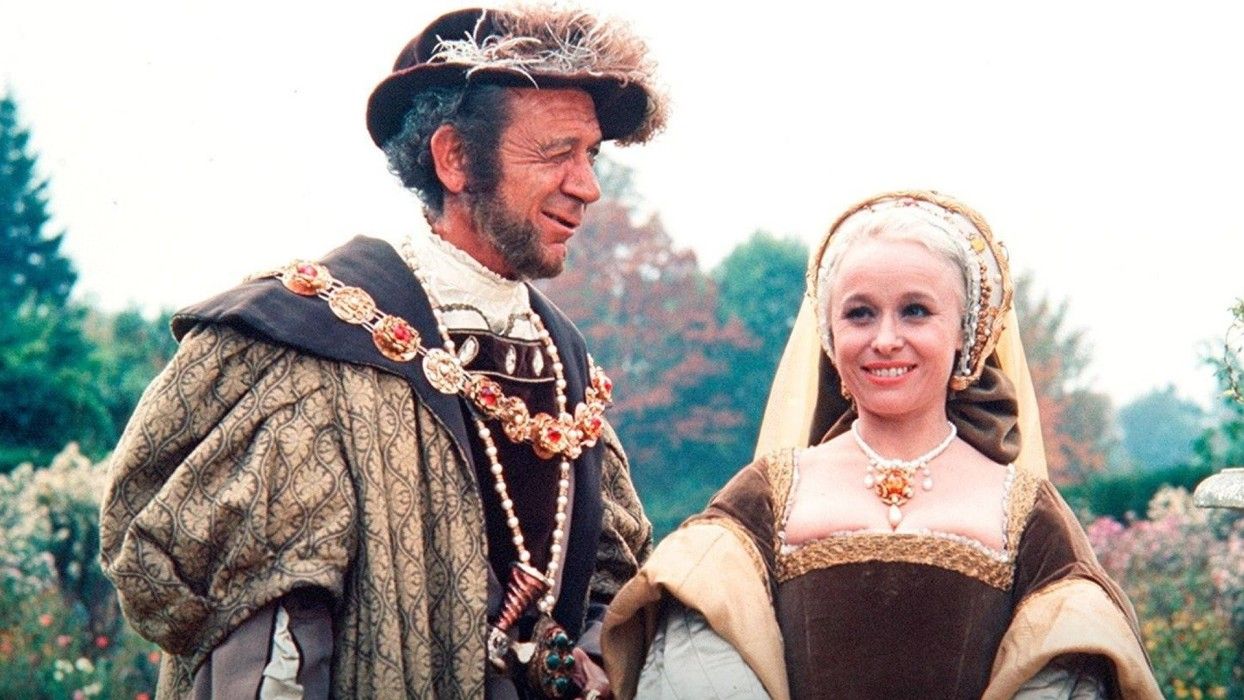
Carry on Henry (1971)
Rating: B
Dir: Gerald Thomas
Star: Sidney James, Kenneth Williams, Joan Sims, Charles Hawtrey
I had to think for a moment, initially thinking the one about Henry VIII was actually Carry On Don’t Lose Your Head. I guess it could have been, focusing as this does on the Tudor king’s attempts to escape his current marriage by any means necessary. Henry the Eighth is, of course, played by James in one of his most iconic roles. He has just offed one wife, in order to unite with Marie of France (Sims), only to find himself unable to consummate the marriage, due to her fondness for garlic. Conniving advisor Thomas Cromwell (Williams) seeks to find a way out, but a loophole presents itself after Marie becomes pregnant through lecherous equerry, Sir Roger de Lodgerley (Hawtrey in a rare hetero role).
The plotting here is considerably tighter than most of the series, with an actual, significant story-line involving Marie’s French relations threatening to invade if the marriage can’t be proven a happy one to their satisfaction. The resulting situation proves remarkably fluid, causing Cromwell to torture Sir Roger to confess his infidelity, retract his confession, retract his retraction, etc. By the end, courtesy of the rack and iron maiden, he could find employment as a sprinkler system. Meanwhile, Henry’s eye continues to roam, settling on the charmingly naive Bettina of Bristol (Barbara Windsor), who gets brought in to act as Marie’s lady-in-waiting. Specifically, waiting until Marie is no longer in the marital picture.
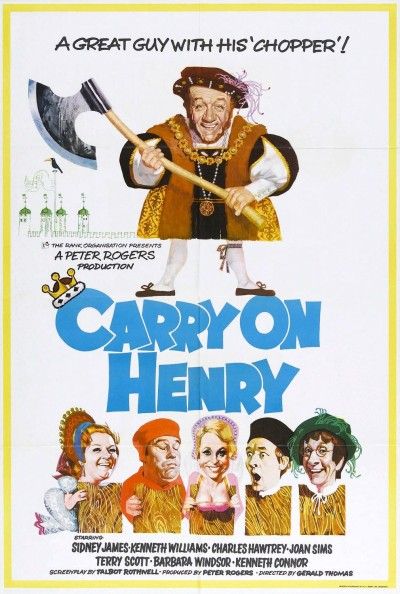 I do want to go on the record and say I’m not sure about the historical accuracy for much of this. Never mind the additional wives, it lobs Cromwell, Fawkes, guillotines, bananas and cups of tea into the sixteenth century mix, demonstrating a frankly shoddy lack of research. Fortunately, it’s damn funny, with some of the sharpest dialogue you can imagine. Henry asks Cromwell about Marie, “Has she been chaste?” to which the advisor responds, “Yes, all over Normandy.” There’s any number of similar exchanges, which still prove capable of making me laugh out loud. I think the advantage of the historical Carry Ons like this one, is they operate without any contemporary elements which would inevitably date them. In some ways, this could almost be a Shakespearean comedy, operating on wordplay and bawdiness.
I do want to go on the record and say I’m not sure about the historical accuracy for much of this. Never mind the additional wives, it lobs Cromwell, Fawkes, guillotines, bananas and cups of tea into the sixteenth century mix, demonstrating a frankly shoddy lack of research. Fortunately, it’s damn funny, with some of the sharpest dialogue you can imagine. Henry asks Cromwell about Marie, “Has she been chaste?” to which the advisor responds, “Yes, all over Normandy.” There’s any number of similar exchanges, which still prove capable of making me laugh out loud. I think the advantage of the historical Carry Ons like this one, is they operate without any contemporary elements which would inevitably date them. In some ways, this could almost be a Shakespearean comedy, operating on wordplay and bawdiness.
The production values are very good, helped out by some genuinely historic-looking locations, along with costumes that, again, stand out more than those of a contemporary production would. Sims also impresses, and it’s nice that it’s merely her fondness for garlic which is the deal-breaker for King Henry. Marie is depicted as perhaps the smartest character on screen, though it’s interesting to consider what the film would have been like, had Harry Secombe played the part of the English monarch, as was originally considered. We may have dodged a bullet there. When you think of all the roles Sid James had in the franchise, this is likely one of those which would come first to mind.
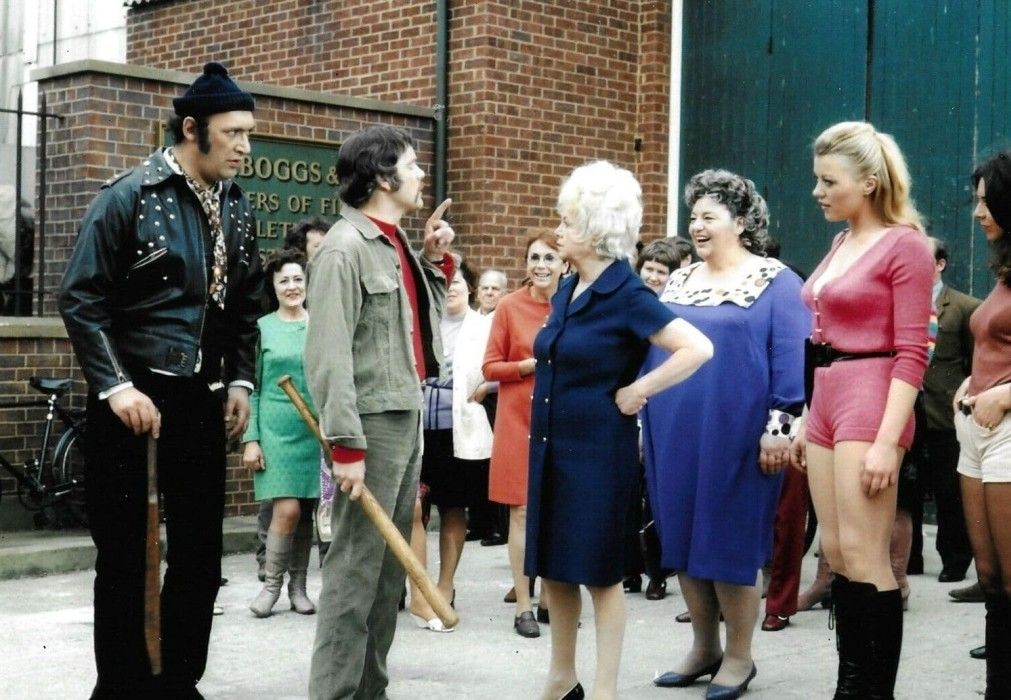
Carry On at Your Convenience (1971)
Rating: C
Dir: Gerald Thomas
Star: Kenneth Cope, Sidney James, Kenneth Williams, Jackie Plummer
a.k.a. Carry On Round the Bend
Somewhat notoriously, this is reportedly the first in the franchise to bomb on release – it took five years to recover its budget, due to overseas sales, etc. The generally accepted reason is the film making fun of trade unions, and thereby alienating the British working class who were the series’s core audience. I’m a bit sceptical of this. Working class humour in the seventies was pretty robust: the satire here is hardly cruel or harsh, and is very specific in nature. The target is Vic Spanner (Cope), the shop steward at the ceramics factory owned by W.C. Boggs (Williams), who will call the workers out on strike at the drop of a tea-break. Or if the local football team is playing at home.
In between the bouts of industrial action, the plotting here is back to being loose. A contract to deliver bidets to the Middle East. A love-triangle between Spanner, Boggs’s son Lewis (Richard O’Callaghan, as bland as ever) and tea-girl Myrtle (Plummer), the daughter of factory foreman Sid Plummer (James). A company outing to Brighton. The budgie belonging to Sid’s wife (Hattie Jacques) predicting horse-races. It never particularly gels into anything much, and that may explain its lacklustre performance, as much as any trade union sympathies. Though that the title was originally going to be Carry On Comrade might suggest where the makers’ sympathies lie, in the struggles which tore apart Britain in the early seventies.
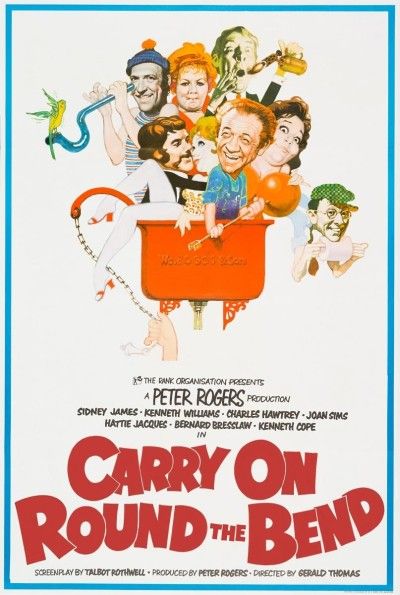 Given the name and the situation, I was expecting there to be considerably more toilet humour. This certainly exists – it could hardly be otherwise, in a time where, apparently, you couldn’t even describe a bidet’s function. It is perhaps the only movie in history to have a credit to “Royal Doulton Sanitary Potteries”, though according to the IMDb, Twyfords actually provided the ceramic items for the film. But the script gets much of that out of its system (or cistern?) early, and thereafter concentrates on the other elements, outlined above. The problem is, much of it isn’t particularly amusing, though I did like the cinema visit to see The Secret Glory of Love, a film rejected by the BBFC, but approved by the local council.
Given the name and the situation, I was expecting there to be considerably more toilet humour. This certainly exists – it could hardly be otherwise, in a time where, apparently, you couldn’t even describe a bidet’s function. It is perhaps the only movie in history to have a credit to “Royal Doulton Sanitary Potteries”, though according to the IMDb, Twyfords actually provided the ceramic items for the film. But the script gets much of that out of its system (or cistern?) early, and thereafter concentrates on the other elements, outlined above. The problem is, much of it isn’t particularly amusing, though I did like the cinema visit to see The Secret Glory of Love, a film rejected by the BBFC, but approved by the local council.
Otherwise, while some lines are certainly funny, and the performances are solid enough, the only extended sequence I enjoyed was the return journey from Brighton. It becomes a Benny Hill-like sequence of sped-up pub visits and toilet breaks, accompanied by an equally frenetic medley of rapid-fire songs by regular composer Eric Rogers. The initial cut is supposed to have run fifty minutes over, leading to the removal of Terry Scott’s entire role as a union boss. I wonder if the editing necessary as a result, might be part of the problem. As is, threads like Sid’s psychic budgie, or his distinctly non-humourous unrequited relationship with co-worker Chloë Moore (Joan Sims), come off as unfinished ideas rather than coherent elements.
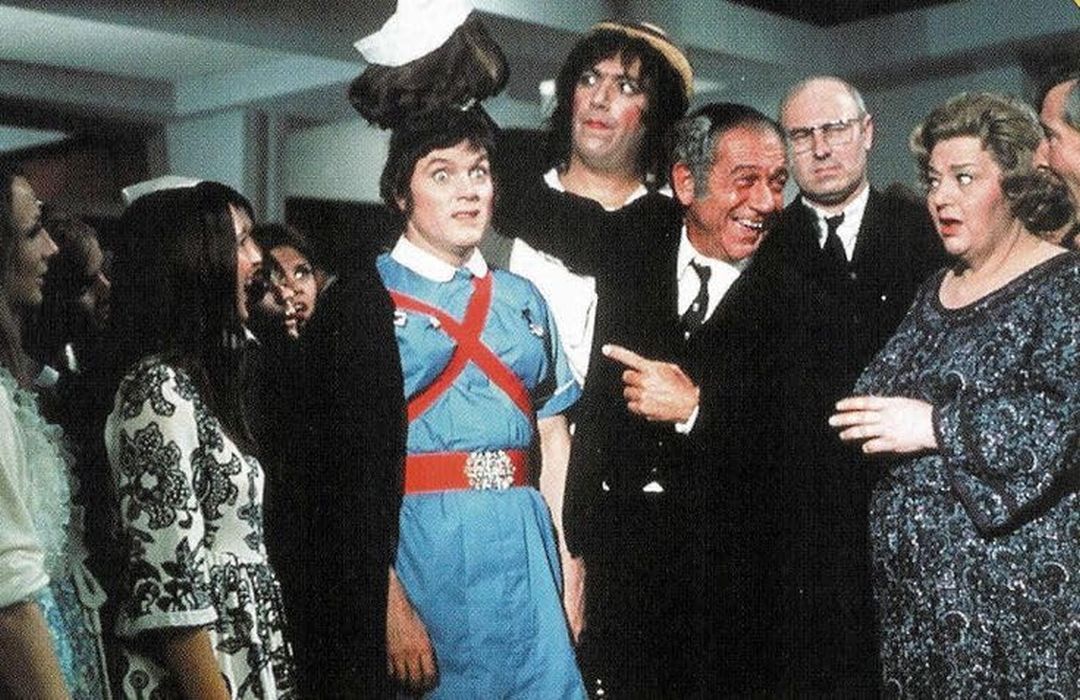
Carry on Matron (1972)
Rating: C+
Dir: Gerald Thomas
Star: Hattie Jacques, Sid James, Kenneth Williams, Kenneth Cope
“What, again?” That was my initial reaction to discovering that next up was another hospital-based entry. To be fair, the last one was actually released back in 1969, so in real-time there was a reasonable gap between them – rather than barely a month which passed for this feature. Still, once again you’ve got Jacques as the matron, Williams as the top doc – this time, adding hypochondria to the mix – Barbara Windsor as a hot nurse, etc. If it feels you’ve seen it all before… Yeah, you largely have. Though rather than a general facility, this takes place at Finisham Maternity Hospital, where Sid Carter (James) and his gang, including son Cyril (Cope), plan to steal the supply of contraceptive pills for sale abroad.
Naturally, things don’t go as planned. Not least because said plan includes sending Cyril in, disguised as a female nurse, to scope out the situation. He ends up sharing a room with Babs’s character, Susan Ball, having to deliver triplets in the back of an ambulance, etc. The rest of the film is occupied by the usual shenanigans, such as Sir Bernard Cutting (Williams) and his affection for Matron (Jacques), a patient who simply refuses to give birth (Joan Sims), sexual harassment by the appropriately named Dr. Prodd (Terry Scott), etc. You know the kind of stuff. But I will award bonus points for small roles from Wendy Richards, soon to be of Are You Being Served? fame, and future Bond girl, Madeline Smith.
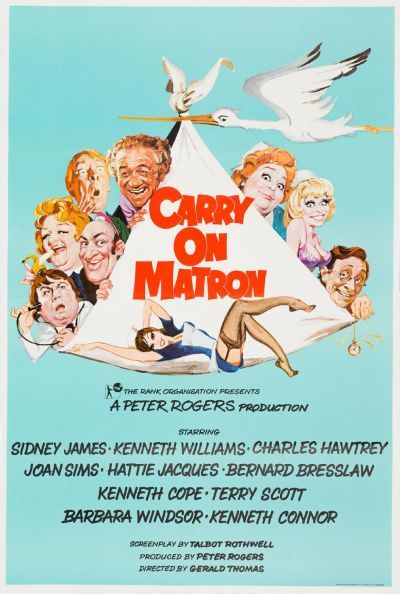 While the “pill” plot may be dated, it is nicely-handled, feeling like it might have strayed in from an Ealing comedy in concept. The execution, of course, is pure Carry On, mixed with classic British pantomime. To the audience, Cope is as convincing as a panto dame when in his role as “Cyrille”, possessing all the feminine grace of a wounded buffalo. But just about everyone in the film buys into the illusion, such as Dr. Prodd going into full wolf-mode. The eventual heist is an ode to chaos, as the gang first try to purloin the keys to the medicine storage room from Matron, before giving up and resorting to more explosive methods of access. Comedic anarchy ensues, with them pursued through the hospital by staff and patients.
While the “pill” plot may be dated, it is nicely-handled, feeling like it might have strayed in from an Ealing comedy in concept. The execution, of course, is pure Carry On, mixed with classic British pantomime. To the audience, Cope is as convincing as a panto dame when in his role as “Cyrille”, possessing all the feminine grace of a wounded buffalo. But just about everyone in the film buys into the illusion, such as Dr. Prodd going into full wolf-mode. The eventual heist is an ode to chaos, as the gang first try to purloin the keys to the medicine storage room from Matron, before giving up and resorting to more explosive methods of access. Comedic anarchy ensues, with them pursued through the hospital by staff and patients.
The other stuff isn’t as effective. I did laugh at the story told to Dr. Prodd by one patient (Margaret Nolan, who was the barmaid in Last Night in Soho, shortly before she passed away) about her 88-year-old husband, their lodger and her pregnancy. It’s pure music-hall, and if you don’t groan at the punchline, the odds of you having made it to this, the twenty-third entry in the franchise, are likely slim. That aside, perhaps it’s foreknowledge, yet there is a sense the participants, on both sides of the screen, are beginning to go through the motions. The talent for humour is still there. While that never gets old, I can’t help feeling this is tending towards comedy as contractual requirement.
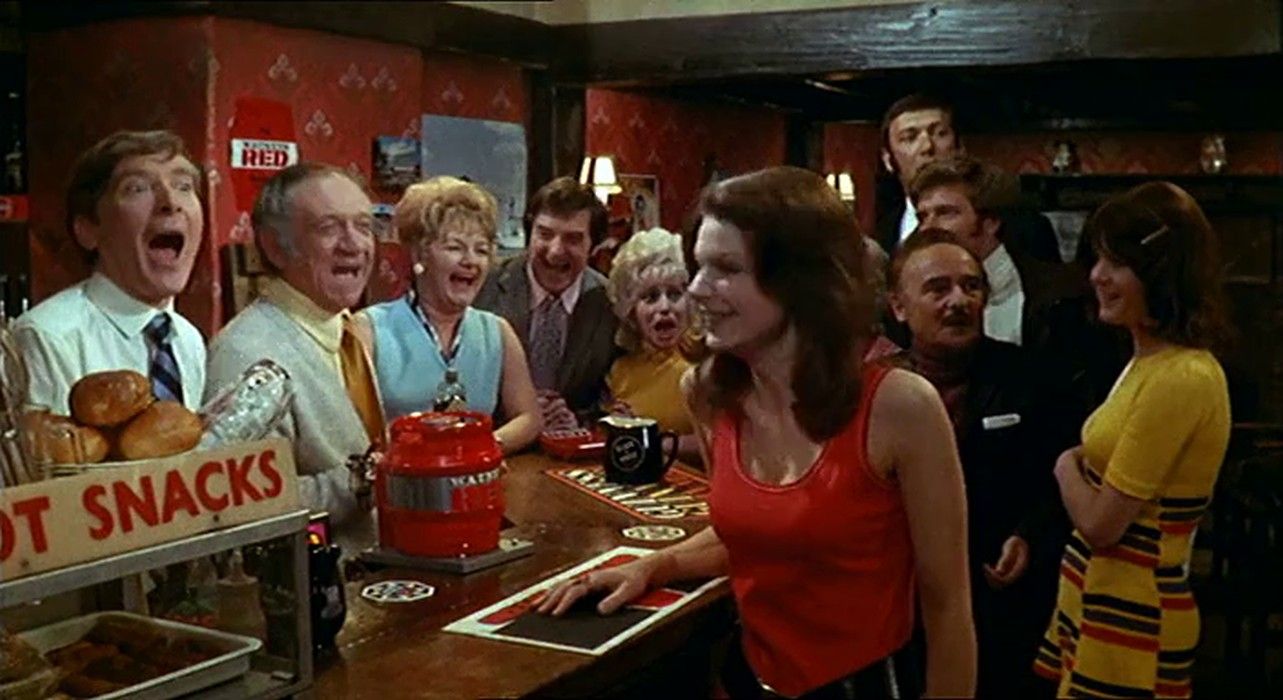
Carry On Abroad (1972)
Rating: C
Dir: Gerald Thomas
Star: Sid James, Kenneth Williams, Joan Sims, Peter Butterwotth
A seventies comedy set in a largely unsuitable hotel, run by an inept man and his shrewish wife. They are wholly unqualified to deal with the residents, or any of the subsequent situations, which escalate over the course of time, ending in complete farce. Sound familiar? But a full two and a half years before the first episode of Fawlty Towers was recorded, the Carry On team got their first. Of course, there are massive differences. The hotel in this question is in the Spanish resort of Elsbels, rather than Torquay, and is operated by Pepe (Butterworth) and his wife Floella (Hattie Jacques). Pepe is considerably less irritable than Basil, though has a similar “Everything is fine! FINE!” approach – along with a mock-Spanish accent, reminiscent of a certain waiter from Barcelona.
Oh, and the builders are in: not Irish ones, though the local variety are little more proficient. Hence, the hotel is unfinished when a party from Wundatours, under Stuart Farquhar (Williams), shows up ready to enjoy a weekend of fun and sun for the low price of seventeen quid, all in. Among the tourists is pub owner Vic Flange (James) and his wife, Cora (Sims) – the latter a late stand-in for his bit on the side, Sadie Tomkins (Barbara Windsor). There’s also a group of monks, two dolly-birds on the pull (Sally Geeson and Carol Hawkins), a couple who are about as gay as you could get away with at the time, and a random Scotsman, played by legendary entertainer Jimmy Logan.
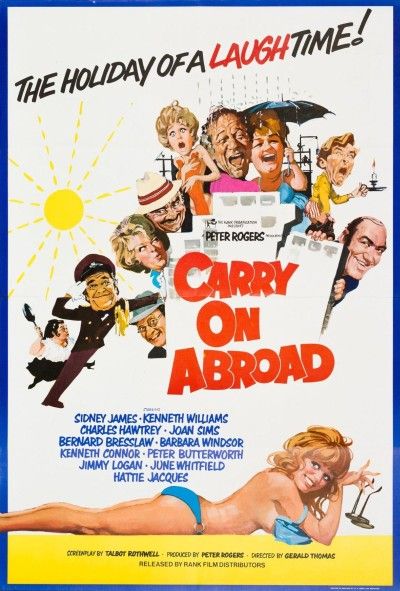 You will not be surprised to hear that anything that can go wrong, does, from the weather to the hotel collapsing on the final night during a torrential downpour. Not that the guests mind, the champagne punch at the final night reception having been spiked with aphrodisiac by multiple parties. Chaos ensues, unsurprisingly. While the similarities to Fawlty Towers are almost certainly purely coincidental, it’s still a comparison which does not reflect well on the movie. Indeed, it goes to show how near-perfect the John Cleese vehicle was, both in content and execution. There’s hardly a slack line of dialogue or moment over the dozen episodes. Here? Not so much, despite what’s likely Butterworth’s best performance (or performanceS) of the franchise.
You will not be surprised to hear that anything that can go wrong, does, from the weather to the hotel collapsing on the final night during a torrential downpour. Not that the guests mind, the champagne punch at the final night reception having been spiked with aphrodisiac by multiple parties. Chaos ensues, unsurprisingly. While the similarities to Fawlty Towers are almost certainly purely coincidental, it’s still a comparison which does not reflect well on the movie. Indeed, it goes to show how near-perfect the John Cleese vehicle was, both in content and execution. There’s hardly a slack line of dialogue or moment over the dozen episodes. Here? Not so much, despite what’s likely Butterworth’s best performance (or performanceS) of the franchise.
He is the exception rather than the rule, and few of the others deliver much worthy of note. It’s most notable for stoically refusing to shoot much further afield than the Pinewood back-lot, where the hotel was built. Still, it’s convincing enough for the purpose, which is to be a backdrop for the expected casual lechery and cheerful nationalism (pretty sure there’s not a single actual Hispanic in the entire cast!). I did note the presence of June Whitfield as straight-laced Evelyn Blunt; future TV husband Terry Scott had a role too, but it got cut out. Little else will stick in the mind, although it was the last entry in the series for Charles Hawtrey. It’s not a great send-off.
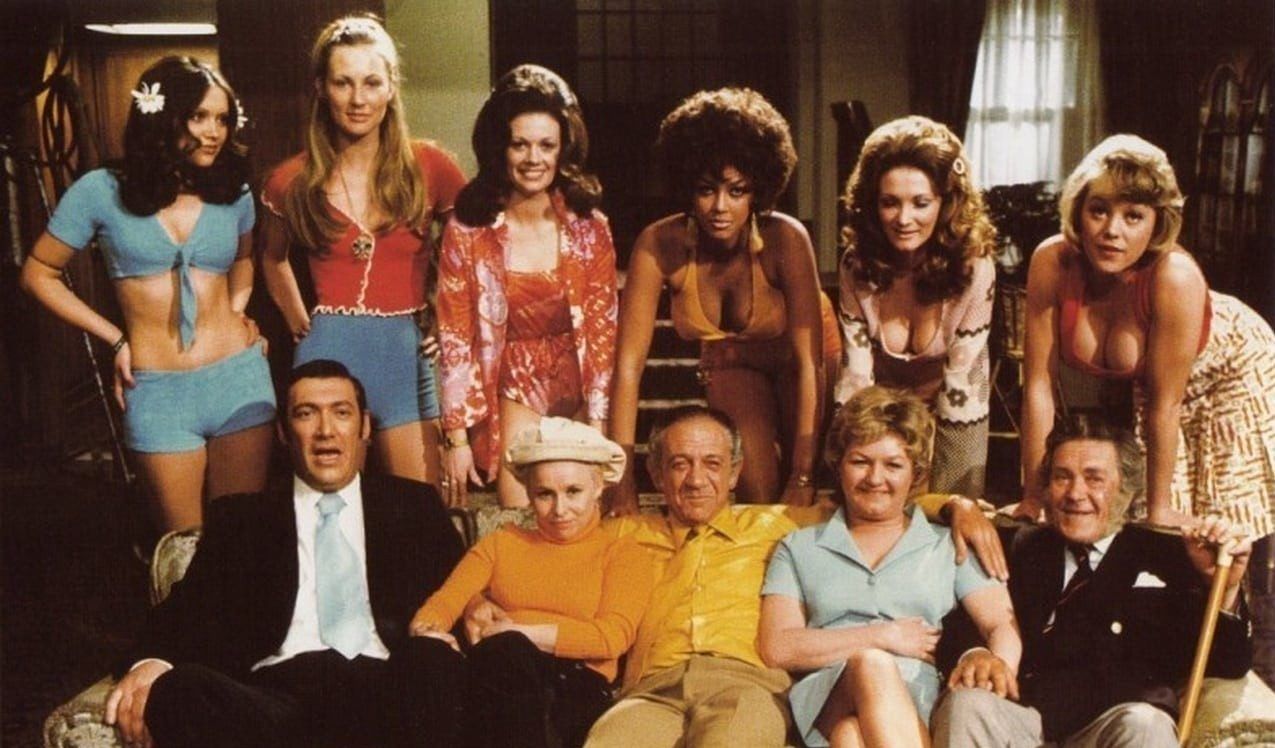
Carry On Girls (1973)
Rating: C
Dir: Gerald Thomas
Star: Sid James, Bernard Bresslaw, Barbara Windsor, June Whitfield
It’s interesting that I watched this the same afternoon as The Punishment, a French movie also made in 1973. While both are (loosely) about sex, and in particular the objectification of women’s bodies, the tone and content could hardly be more disparate. This is basically a feature-length adaptation of a Donald McGill seaside postcard, all sauce in lieu of sizzle. You can almost hear Charles Hawtrey’s “Ooh, I say!” or picture Kenneth William’s appalled sneer in response to much of the goings-on here. Though neither man are present, with the role intended first for Hawtrey, then Williams, ending up going to… Jimmy Logan. If that isn’t a portent of the looming End Times for the franchise, I don’t know what is.
It takes place in the seaside town of Fircombe, which is either pronounced Firk’em or Fir-coom, depending on who you’re speaking to. In order to bring in holiday business, the town council agrees to the suggestion of local businessman Sidney Fiddler (James) to hold a beauty pageant. This does not go over well with councilwoman Augusta Prodworthy (Whitfield), who vows to do everything in her power to disrupt the event, along with her liberated female friends [This element was inspired by the real-life disruption of the 1970 Miss World event]. Fiddler brings in publicist pal Peter Potter (Bresslaw) to promote the event by any means necessary, including dressing up as a contestant to create artificial controversy. But Peter is not happy when his girlfriend, Paula (Valerie Leon). decides to sign up.
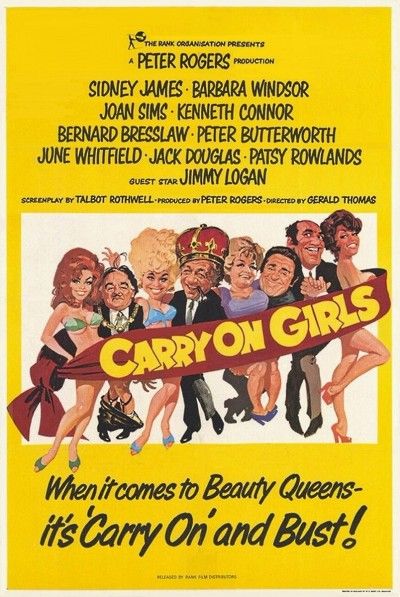 That element is one of a few aspects here which make it a morally provocative entry from a modern perspective. It’s acknowledging the double-standard that certain activities are okay for some women, just not “your” woman. “You don’t own me!” snaps Paula, to which Peter replies, “I damn well do!” There’s also the way it’s the conservative member of the council opposing the pageant, on grounds of general prudery. The tables have flipped since, with the left being those leading the charge against such events. However, it’s likely Peter’s pageant entry where times have changed most. Here, the local police are called to solemnly proclaim it an offense, “If a man masquerades as a woman in order to win a prize.” Now? Not so much.
That element is one of a few aspects here which make it a morally provocative entry from a modern perspective. It’s acknowledging the double-standard that certain activities are okay for some women, just not “your” woman. “You don’t own me!” snaps Paula, to which Peter replies, “I damn well do!” There’s also the way it’s the conservative member of the council opposing the pageant, on grounds of general prudery. The tables have flipped since, with the left being those leading the charge against such events. However, it’s likely Peter’s pageant entry where times have changed most. Here, the local police are called to solemnly proclaim it an offense, “If a man masquerades as a woman in order to win a prize.” Now? Not so much.
There’s no shortage of bathing beauties in bikinis, with character names like Hope Springs (Windsor), Dawn Brakes (Margaret Nolan) and Ida Downs. The bad news is, neither this nor all of the intellectual questions don’t do enough to distract you from the general lack of memorable humour, outside of a surprisingly physical catfight between Hope and Dawn. The makers brought in Robin Askwith as the son of Mrs. Prodworthy, shortly before he’d find stardom elsewhere in the not dissimilar, though raunchier Confessions of a… franchise, but he makes no real impression here. Neither does much of this, except for Fiddler’s splendid response to his female nemesis, “If you think nine inches is an average one, you’ve been spoiled.” They are, of course, discussing summer rainfall figures.
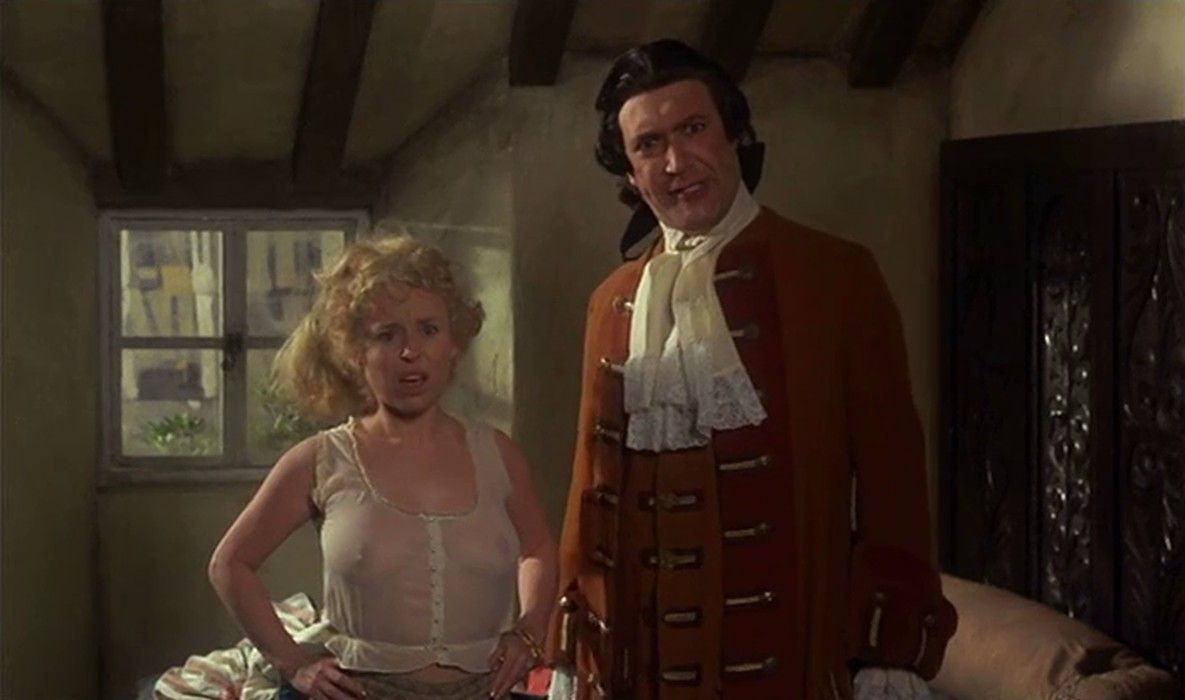
Carry on Dick (1974)
Rating: C-
Dir: Gerald Thomas
Star: Sidney James, Barbara Windsor, Kenneth Williams, Hattie Jacques
And, now, the end is near… This is the final Carry On for a slew of those involved, on both sides of the camera. In front, it was the last hurrah for three of the four leads, in James, Windsor and Jacques, and perhaps more importantly, also marked the final time Talbot Rothwell wrote the script. He apparently had a breakdown due to overwork, and considering this was his twentieth in the franchise, he can hardly be blamed for suffering from burn-out. It definitely feels as if it’s going through the motions: I’m hard pushed to think of a single occasion where I actually laughed out loud. The fun characters can only go so far.
It feels like something of a re-tread of Don’t Lose Your Head, both in the 18th-century setting, and in the basic set-up, of William’s character attempting to catch James’s criminal. It takes place in 1750, with James playing notorious footpad, Big Dick Turpin. While Turpin was indeed a famous highwayman, he had in reality been executed eleven years earlier. I guess in this version, he escapes the gallows and adopts the identity of the pious Reverend Flasher, minister to the village of Upper Dencher. It allows him to ply his trade by night, along with sidekicks Harriett (Windsor) and Tom (Peter Butterworth). This dual-persona, religious man and thief, reminds me of the Doctor Syn character, previously used in the Hammer film Captain Clegg, where Peter Cushing played the role.
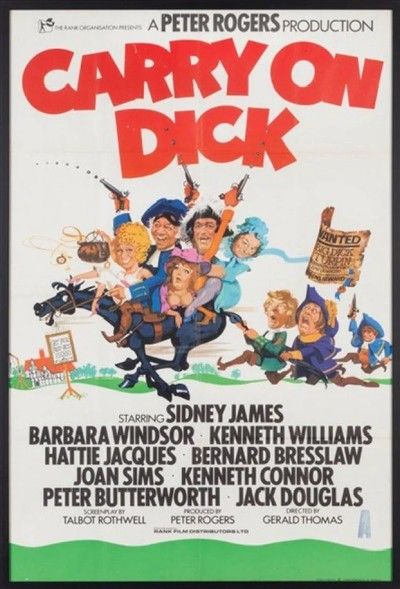 Seeking to capture Turpin are the newly-established Bow Street Runners (who genuinely were created just the previous year), and in particular, Captain Desmond Fancey (Williams) and Sergeant Jock Strapp (Jack Douglas). They discover that Turpin can be identified by a distinguishing mark on his penis – yes, that’s the level at which we are operating here – but actually capturing the highwayman is considerably trickier. It doesn’t help that Fancey keeps confiding in their mission to the Reverend, so he’s basically one step ahead of them for the entire movie. The problem is, the film seems more interested in the plot than actually bothering to be funny. Obvious lines like Fancey asking Harriett, “Where can we find Dick?” is what passes for peak comedy here.
Seeking to capture Turpin are the newly-established Bow Street Runners (who genuinely were created just the previous year), and in particular, Captain Desmond Fancey (Williams) and Sergeant Jock Strapp (Jack Douglas). They discover that Turpin can be identified by a distinguishing mark on his penis – yes, that’s the level at which we are operating here – but actually capturing the highwayman is considerably trickier. It doesn’t help that Fancey keeps confiding in their mission to the Reverend, so he’s basically one step ahead of them for the entire movie. The problem is, the film seems more interested in the plot than actually bothering to be funny. Obvious lines like Fancey asking Harriett, “Where can we find Dick?” is what passes for peak comedy here.
You can’t fault the actors, who try to do the best with what their given. In particular, Windsor proves game for anything with her top first flying open, and then being given a costume that leaves little to the imagination (top). It’s easy to understand why she all but gave up the business, until an unexpected renaissance in the nineties, appearing as Peggy Mitchell in 1,691 episodes of Eastenders. In comparison to Don’t Lose Your Head, where the dialogue and humourous situations positively fizz off the page, this is by the numbers stuff, and certainly not a fitting send-off for the trio who had anchored many of the franchise’s most memorable entries. If this may not quite have been the last stop on the line, you can certainly see it from here.
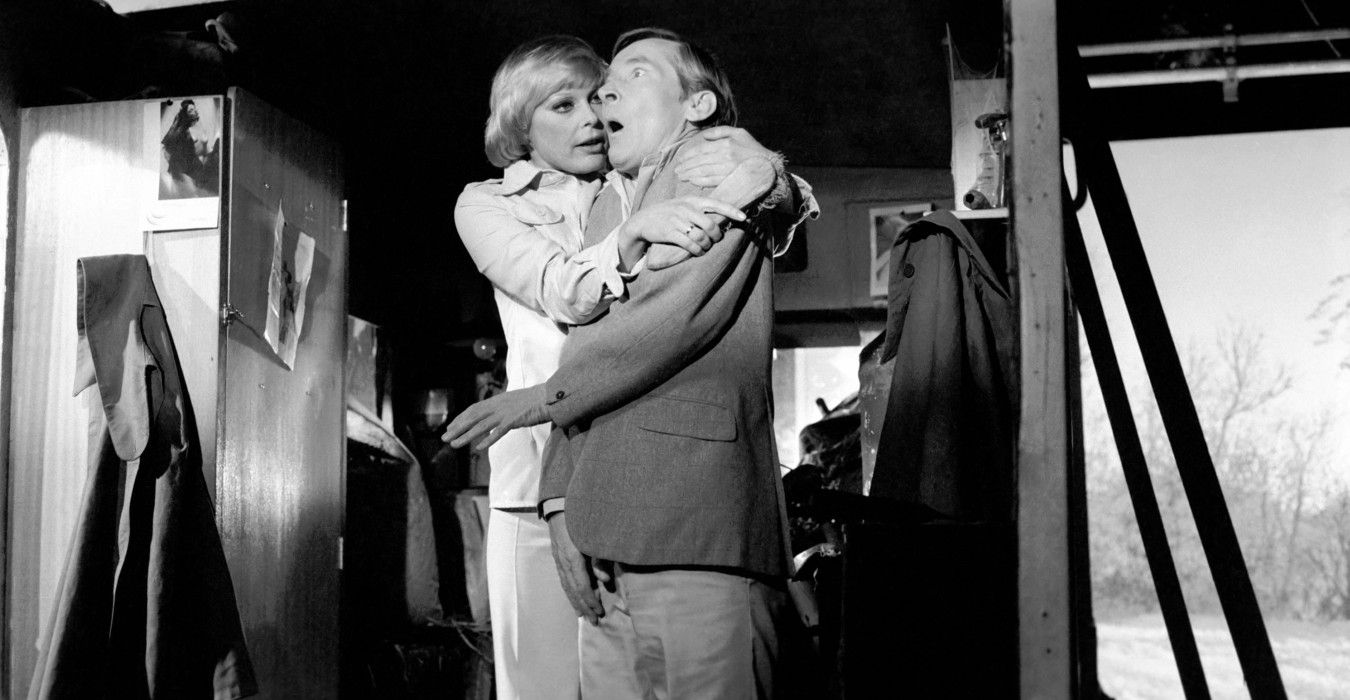
Carry on Behind (1975)
Rating: C-
Dir: Gerald Thomas
Star: Elke Sommer, Kenneth Williams, Windsor Davies, Jack Douglas
The loss of Talbot Rothwell’s sure and experienced hand on the script is probably the biggest loss here, although the absence of Sid James on theatrical tour is also felt. The lecherous role played by Davies seems to have been intended for James. Although the newcomer would have been familiar to audiences at the time from his role in It Ain’t Half Hot Mum, there’s just something “off” about his performance. The whole thing, frankly, feels like a mockbuster version of Carry on Camping, with the same basic scenario of a weekend at a camp site. Indeed, the same location of the orchard at Pinewood Studios was used as for its predecessor, and the weather proved similarly uncooperative.
Rather than wrangling a school trip, Williams is now archaeologist Professor Roland Crump running a dig nearby with the help of expert on Roman remains, Professor Anna Vooshka (Sommer). In the caravan park are Fred Ramsden (Davies) and his pal. Ernie Bragg (Douglas), who are there on a weekend away from their wives, with Fred in particular intending to take full advantage of the freedom. While the local dolly birds (Sherrie Hewson and Carol Hawkins) are largely immune to their dubious charms, they are happy to take advantage, in a way which feels more mean-spirited than comedic. There are a slew of minor subplots to fill up running time, involving the usual henpecked husbands, shrewish mothers-in-law, and communications breakdowns, plus subsidence, an escaped mynah bird (voiced by director Thomas) and wet paint.
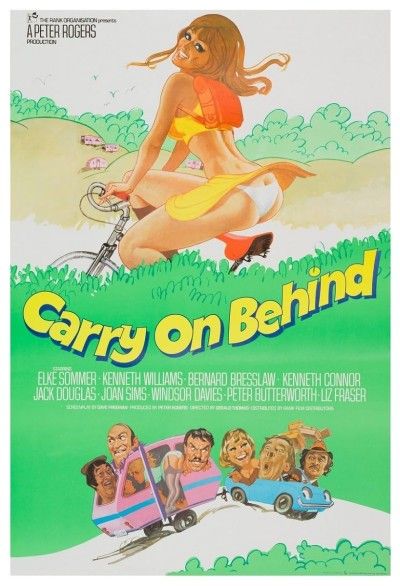 I wasn’t that impressed with Camping, but it’s still somewhat better than this. The main saving grace is Sommer, one of the rare cases in the franchise of a foreigner actually being played by a foreigner, rather than Bernard Bresslaw in brownface. Elke tears into her dialogue with glee, delivering malapropism after malapropism, due to her fractured knowledge and pronunciation of English. These almost inevitably come with deeply seventies sexual undertones, e.g. saying “cramped” in a way that sounds like “crumpet,” confusing “hitting it off” with “having it off”, or looking for cleaning supplies by going round the park asking “Excuse please, you have scrubbers in caravan?” Yet when we’re laughing at Prof. Vooshka, it’s also clear she’s ferociously competent and takes no shit from anyone.
I wasn’t that impressed with Camping, but it’s still somewhat better than this. The main saving grace is Sommer, one of the rare cases in the franchise of a foreigner actually being played by a foreigner, rather than Bernard Bresslaw in brownface. Elke tears into her dialogue with glee, delivering malapropism after malapropism, due to her fractured knowledge and pronunciation of English. These almost inevitably come with deeply seventies sexual undertones, e.g. saying “cramped” in a way that sounds like “crumpet,” confusing “hitting it off” with “having it off”, or looking for cleaning supplies by going round the park asking “Excuse please, you have scrubbers in caravan?” Yet when we’re laughing at Prof. Vooshka, it’s also clear she’s ferociously competent and takes no shit from anyone.
The rest of the cast, however, look to be sleepwalking through their roles; admittedly, the generally weak script doesn’t give them much with which to work. It feels like new writer Dave Freeman, who had worked on The Benny Hill Show for over a decade, took the straightest route possible to any penis reference, and only occasionally captures the surreal spirit of the best entries. A rare such moment sees Fred and Ernie use an entire wardrobe door to check if Prof. Crump is still breathing, because that’s the only mirror in their caravan. Otherwise, there’s little of note, even less of the usual sense of escalating chaos, while the ending comes abruptly, almost as a relief.
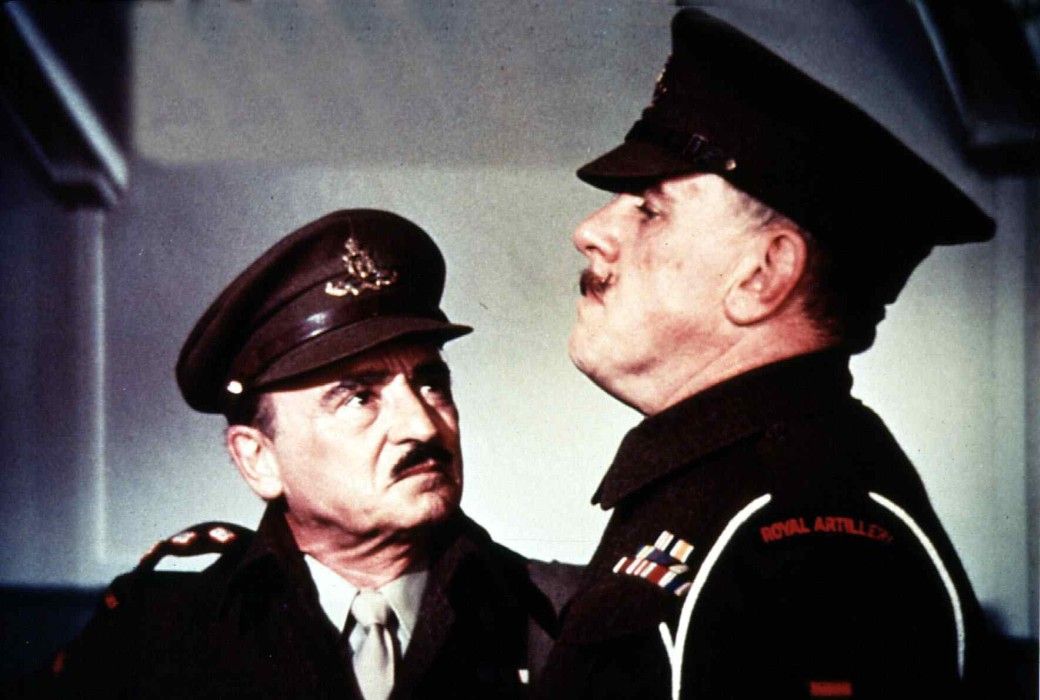
Carry on England (1976)
Rating: C+
Dir: Gerald Thomas
Star: Kenneth Connor, Windsor Davies, Patrick Mower, Joan Sims
Going by its reputation, I expected to hate this, and I didn’t: I dare venture to suggest, it improves on the previous year’s Carry on Behind. While there is a similar sense of it being a retread (in this case, of Carry On Sergeant), there is enough fresh to make it feel somewhat original. However, I would definitely suggest not expecting a traditional Carry On film. It works better treated as a stand-alone entity, closer in tone to other British sex comedies of the time like the Confessions series. In a weird, meaningless coincidence, I almost watched WW1 flying epic The Blue Max instead of this, only discovering later both were David Pursall and Jack Seddon scripts.
England takes place in the next global conflict, specifically in 1940 when the Luftwaffe are threatening British cities. One of the groups tasked with keeping the air free of Nazi planes is the 1313th Anti-Aircraft Battery, to which Capt. Melly (Connor) is sent, in order to get them into shape. He soon discovers they are far more interested in other pursuits, being a mixed gender outfit. They’re thoroughly unused to military discipline, despite the presence of the formidable Sergeant Major “Tiger” Bloomer (Davies). Melly tries to lick them into shape, only for Sergeant Len Able (Mower) – and, yes, there are other soldiers called Ready and Willing – to lead a campaign of civil disobedience against the new regime.
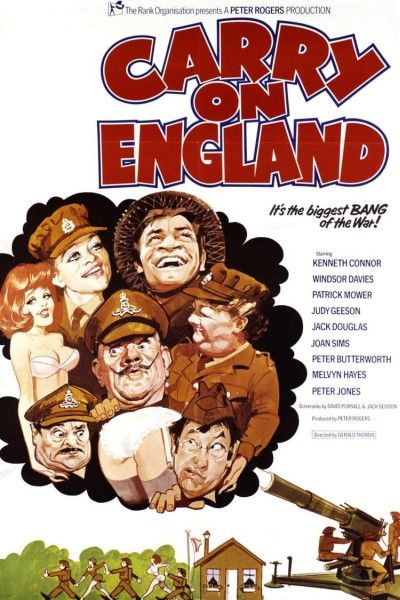 What I loved about this is Davies, who is the very epitome of the yelling NCO. Now, obviously, it’s a blatant copy of his role as Sergeant Major Williams in now-“forbidden” sitcom, It Ain’t Half Hot Mum, which was a huge hit on TV at the time. The presence among the soldiers beneath him of Melvyn Hayes, another actor from the show, is no coincidence. But it’s still glorious to watch, his character perpetually seeming about the thickness of a blood-vessel away from a fatal aneurysm. I also enjoyed future voice of The Book in The Hitchhiker’s Guide to the Galaxy, Peter Jones, as an inspecting Brigadier with a nice line in dry puns, to which nobody else ever reacts.
What I loved about this is Davies, who is the very epitome of the yelling NCO. Now, obviously, it’s a blatant copy of his role as Sergeant Major Williams in now-“forbidden” sitcom, It Ain’t Half Hot Mum, which was a huge hit on TV at the time. The presence among the soldiers beneath him of Melvyn Hayes, another actor from the show, is no coincidence. But it’s still glorious to watch, his character perpetually seeming about the thickness of a blood-vessel away from a fatal aneurysm. I also enjoyed future voice of The Book in The Hitchhiker’s Guide to the Galaxy, Peter Jones, as an inspecting Brigadier with a nice line in dry puns, to which nobody else ever reacts.
There’s no doubt that the lack of any regular players save Connor in the major roles (there are small parts for Sims, Jack Douglas and Peter Butterworth), weaken the film. The sex-positive plot would certainly have benefited from the earthy humour of Sid James: he was unavailable due to signing on for a touring stage play, and actually died on stage, a week before filming started. This was originally intended as a sketch in the TV series, Carry On Laughing, and might have worked better at that length. However, I liked it better the longer it went on, and it started to feel like a parody of PoW movies and series. For example, how the men try to tunnel into the women’s quarters, at the same time the women are tunneling into theirs. Not great, to be be sure, but not as irredeemably terrible as I expected.
